Domiciliary Care Business Plan: How to Navigate the Industry and Secure Long-Term Success
- January 25, 2024
Are you considering starting a domiciliary care business? With an aging global population and the increasing demand for home care services, it’s a lucrative industry to venture into. But, as with any business, success lies in careful planning and execution. In this comprehensive article, we will guide you through the process of creating an effective domiciliary care business plan that will help you navigate the industry and secure long-term success.
From understanding the market and assessing the competition to identifying your target audience and defining your unique selling point, this article covers it all. We will delve into the essential components of a strong business plan, such as financial projections, marketing strategies, staffing considerations, and quality and compliance.
By the end of this article, you will have a clear roadmap to guide you through the complexities of starting and running a domiciliary care business. Whether you’re a seasoned entrepreneur looking to diversify your portfolio or someone passionate about making a difference in people’s lives, this article is a must-read. Don’t miss out on the opportunity to carve a rewarding career in the booming domiciliary care industry.

Understanding the Domiciliary Care Industry
The domiciliary care industry, also known as home care, provides essential support and assistance to individuals who prefer to receive care in their own homes. This industry has witnessed substantial growth in recent years due to various factors, including the aging population and the desire for personalised care.
To navigate the domiciliary care industry successfully, it’s crucial to understand its dynamics and trends. The first step is to conduct thorough market research. Analyse the current landscape, including the demand for services, the demographics of the target market, and the regulatory environment. This information will help you identify opportunities and potential challenges, enabling you to develop a business plan tailored to the specific needs of your target audience.
The Importance of a Business Plan in Domiciliary Care
A well-crafted business plan is essential for any entrepreneur looking to enter the domiciliary care industry. It serves as a roadmap, guiding you through each stage of your business’s development and ensuring that you make informed decisions. A comprehensive business plan not only helps you secure funding but also demonstrates your understanding of the industry and your ability to navigate its complexities.
Your business plan should outline your mission, vision, and values, as well as your short and long-term goals. It should also include a detailed analysis of your target market, competitors, marketing strategies, financial projections, and staffing considerations. A solid business plan will serve as a reference point for your own decision-making and growth strategies.
Key Elements of a Domiciliary Care Business Plan
1. Market Analysis and Competitor Research
Before launching your domiciliary care business, a thorough analysis of the market is essential. Identify the demand for home care services in your target area, including the size of the aging population and their specific needs. Assess the competition and understand their strengths and weaknesses. This analysis will help you identify gaps in the market and position your business uniquely. At Walfinch, all franchisees get exclusive rights to a territory including a minimum of 250,000 people and a minimum of 40,000 people aged 65 years and over.
2. Identifying Your Target Audience and Niche
To succeed in the domiciliary care industry, it’s crucial to identify your target audience and define your niche. Determine the specific demographics, preferences, and needs of your target market. Consider factors such as age, medical conditions, and cultural backgrounds. This information will help you tailor your services and marketing strategies to attract and retain clients. One Walfinch franchisee serves a large community of people with Gujurati heritage, for example, so organising a traditional dance called a garba every now and again has been a great way to pick up clients.
3. Developing a Marketing and Sales Strategy
Creating a robust marketing and sales strategy is essential for attracting clients and growing your domiciliary care business. Utilise both traditional and digital marketing channels to reach your target audience. Develop a strong online presence, including a user-friendly website and active social media profiles. Establish partnerships with healthcare professionals and community organizations to expand your reach. All Walfinch franchisees get their own microsite and socials to help you quickly attract new clients.
4. Operations and Staffing Considerations
Efficient operations and adequate staffing are crucial for providing quality domiciliary care services. Develop a detailed plan for service delivery, including scheduling, equipment, and transportation. Hire qualified and compassionate carers who align with your values and mission. Provide ongoing training and support to ensure the highest standard of care.
5. Financial Projections and Funding Options
Creating realistic financial projections is vital for the long-term success of your domiciliary care business. Estimate your startup costs, including licensing, insurance, equipment, and marketing expenses. Determine your pricing strategy based on the services provided and the local market. Explore funding options, such as loans, grants, or partnerships, to secure the necessary capital. Walfinch franchisees receive support on all these things at the beginning and on an ongoing basis.
6. Legal and Regulatory Compliance
Compliance is essential in the domiciliary care industry. Familiarise yourself with the regulations governing home care services. Obtain the necessary licenses and certifications. Develop policies and procedures to ensure compliance with privacy laws, safety standards, and employee regulations. Walfinch franchisees get a dedicated Quality and Compliance Manager who will help you navigate this landscape to make sure you receive positive ratings from your regulator.
Long-Term Success and Growth Strategies
To secure long-term success in the domiciliary care industry, it’s essential to develop strategies for growth and continuous improvement. Regularly evaluate your business performance and identify areas for optimisation. Seek feedback from clients, carers, and other stakeholders to gain insights into areas that can be enhanced.
Invest in technology solutions that can improve operational efficiency and enhance the client experience. Explore opportunities for diversification, such as expanding into specialised care services like live in care. Continuously monitor industry trends and adapt your business strategies to stay ahead of the competition.
Focus on building strong relationships with clients and their families. Provide personalised and compassionate care that exceeds their expectations. Implement a robust client feedback system to measure satisfaction and address any concerns promptly.
Finally, invest in your own professional development as a business owner. Stay informed about industry advancements, attend conferences and workshops, and network with other professionals in the domiciliary care industry. Continuously strive to improve your skills and knowledge to lead your business to long-term success.
Fill in the form below to request more information about running your own home care business.
Enjoyed this article? Share with your network!
Recent Posts
Questions to Ask Before starting an Elder Care Franchise
Why is senior home care the fastest growing industry, steps for creating a successful home care business plan, things to consider before buying a senior care franchise, how profitable is a home care business, national support office.
Unit 17, White Barn, Manor Farm
Manor Road, Wantage
© Walfinch Ltd 2024. All rights reserved.
Privacy Overview
Automated page speed optimizations for fast site performance
- Meet The Team
- Manchester Office
- London Office
- Bank Loan Business Plans Help to secure initial investment
- Crowd Funding Business Plans Attract donations with our support
- Expansion Business Plans Take your business to new heights
- Franchise Business Plans Franchise Success with Hudson
- Grants Business Plans Get buy in from funders
- Immigration Business Plans Expand into overseas markets
- Investor Ready Business Plans Gain trust from investors
- Non Profit Business Plans Reach more service users
- Start up Business Plans Get your ideas off the ground
- Traditional Business Plans Get ready for growth
- Funding Opportunities
- How it works
- Bank Loan Business Plans
- Crowd Funding Business Plans
- Expansion Business Plans
- Franchise Business Plans
- Grants Business Plans
- Immigration Business Plans
- Investor Ready Business Plans
- Non Profit Business Plans
- Start up Business Plans
- Traditional Business Plans
- Testimonials
- Get a Quote
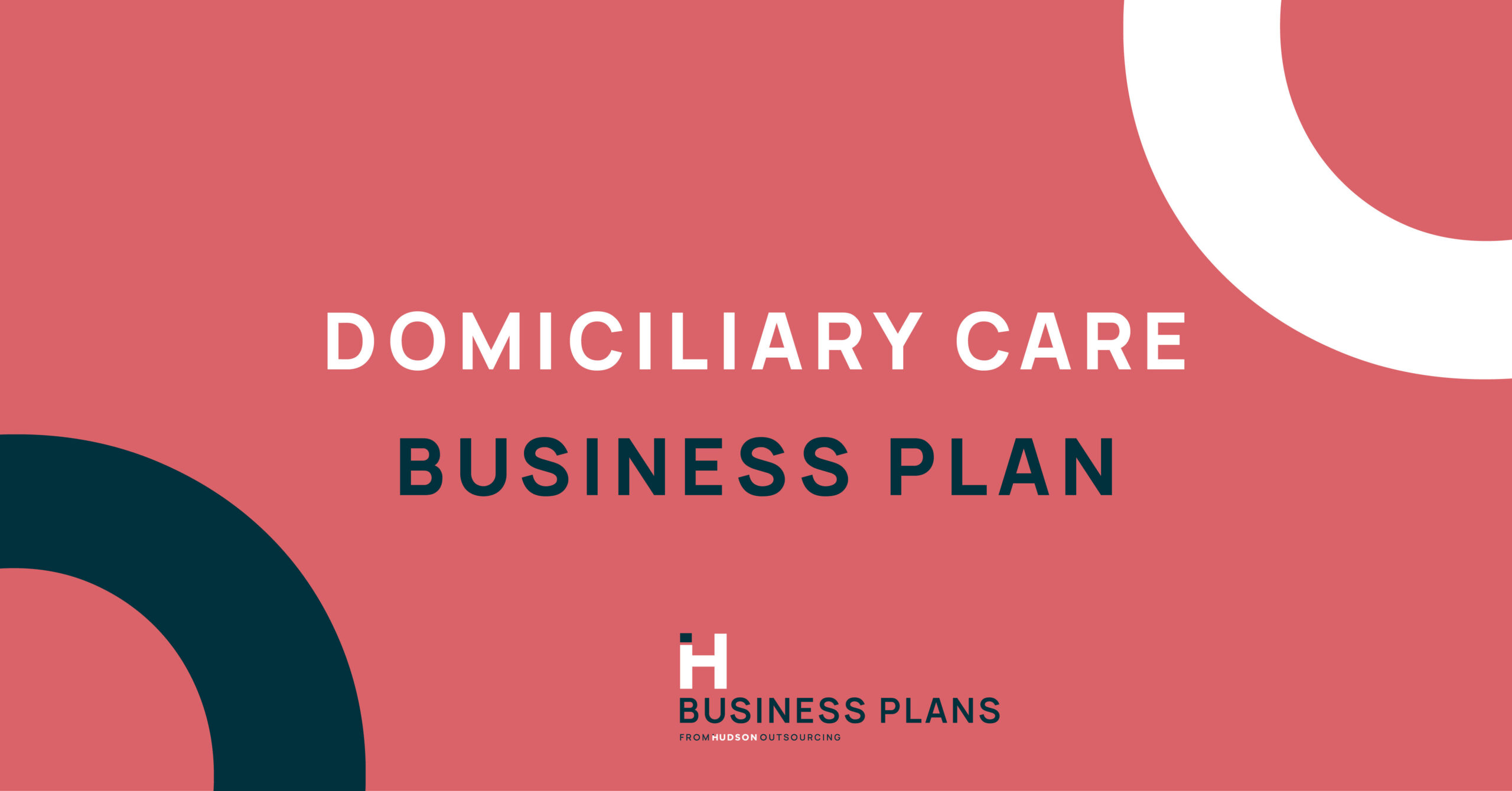
Domiciliary Care Business Plan
March 27, 2023.
Domiciliary care , also known as home care, is a rapidly growing sector within the United Kingdom. With an ageing population and an increasing desire for individuals to remain in their homes for as long as possible, the demand for quality home care services continues to rise. Consequently, starting a domiciliary care business can be both a rewarding and lucrative venture.
However, establishing a successful domiciliary care business requires careful planning and a comprehensive understanding of the various aspects involved.
This blog will delve into the process of writing a robust domiciliary care business plan, touching on the key components and offering tips on how to craft a compelling document that will help secure funding and attract clients.
Executive Summary
Begin your business plan with an executive summary. This section should provide an overview of your business, highlighting the key points that will be covered in more detail throughout the document. Include information on the market opportunity, your unique selling points, and the goals you hope to achieve. Be concise and clear, as this section should pique the interest of potential investors and partners.
Company Overview
In this section, outline the basic details of your business, including:
- Business name and legal structure (e.g., sole proprietorship, partnership, limited company).
- Ownership and management team, including their relevant experience and qualifications.
- The location of your business and the areas you plan to serve.
- Your company mission statement and values.
Market Analysis
A thorough market analysis is crucial to understanding the competitive landscape and identifying opportunities for your domiciliary care business. Research and include the following:
- An overview of the UK domiciliary care market, including current trends and growth projections.
- An analysis of your local market, including demographics, demand for care services, and existing providers.
- A SWOT (Strengths, Weaknesses, Opportunities, Threats) analysis, identifies areas where your business can excel and potential challenges you may face.
- A clear definition of your target audience, including their needs and preferences.
Services Offered
Clearly define the range of services your domiciliary care business will offer. It’s important to strike a balance between providing a comprehensive range of services and specialising in specific areas. Consider the following:
- Personal care (e.g., assistance with bathing, dressing, grooming).
- Domestic support (e.g., housekeeping, laundry, meal preparation).
- Companionship and social care (e.g., conversation, social outings, emotional support).
- Specialist care (e.g., dementia care, end-of-life care, disability support).
- Respite care for family carers.
Marketing and Sales Strategy
A well-thought-out marketing and sales strategy is essential for attracting clients and building your business’s reputation. Outline your approach to promoting your services and engaging with potential clients, considering the following:
- Branding and positioning, including logo, colours, and key messages.
- Marketing channels, such as local newspapers, radio, social media, and online directories.
- Networking opportunities, including partnerships with local healthcare providers, community groups, and care associations.
- Client acquisition strategies, such as referrals, word of mouth, and targeted advertising campaigns.
- Customer retention tactics, including exceptional care quality, regular communication, and ongoing support for clients and their families.
Operations and Staffing
The success of your domiciliary care business hinges on the quality and efficiency of your operations. Detail your plans for managing day-to-day activities, including:
- Staff recruitment and training, ensuring that all carers meet the necessary qualifications and experience levels.
- Policies and procedures for safeguarding clients, maintaining confidentiality, and adhering to industry regulations and standards.
- Quality assurance measures, such as regular staff evaluations, client feedback, and continuous improvement initiatives.
- A system for managing client schedules, care plans, and staff rosters.
- Transportation arrangements for staff members, if required
- Plans for investing in technology and software to streamline operations and improve client care.
Regulatory Compliance and Accreditation
Domiciliary care providers must comply with a variety of regulations and guidelines in the UK. In this section, outline your plans for ensuring compliance and obtaining relevant accreditations, including:
- Registering with the Care Quality Commission ( CQC ) in England, the Care Inspectorate Wales (CIW) in Wales, or the Care Inspectorate in Scotland, depending on your location.
- Developing and implementing robust policies and procedures that adhere to the relevant regulatory frameworks (e.g., Health and Social Care Act 2008, Essential Standards of Quality and Safety).
- Ensuring staff are trained in and adhere to key legislation, such as the General Data Protection Regulation (GDPR), the Equality Act 2010, and the Health and Safety at Work Act 1974.
- Pursuing relevant industry accreditations, such as ISO 9001 or Investors in People, to demonstrate your commitment to quality and continuous improvement.
Financial Projections and Funding Requirements
A strong financial plan is essential for demonstrating the viability of your domiciliary care business and securing funding from investors or lenders. This includes:
- A detailed start-up budget, outlining the costs of setting up your business, such as registration fees, insurance, equipment, marketing, and initial staff recruitment and training.
- Revenue projections for the first three to five years of operation, based on your market analysis and projected client base.
- A cash flow forecast, illustrating your expected income and expenses on a monthly basis, including staff wages, rent, utilities, marketing, and other operational costs.
- A break-even analysis indicates when your business will become profitable.
- Funding requirements, detailing the amount of investment needed to launch and grow your business, and how the funds will be used.
- A contingency plan, outlining how your business will manage potential risks and setbacks, such as changes in regulations, market downturns, or staff shortages.
Risk Management and Mitigation
Every business faces risks, and it’s crucial to identify and plan for potential challenges in your domiciliary care business. In this section, discuss the key risks associated with your business and the strategies you’ll employ to mitigate them. Some common risks and mitigation strategies include:
- Staff shortages: Implement an effective recruitment and retention strategy, offering competitive wages, comprehensive training, and opportunities for career development.
- Client safety and well-being: Develop and enforce robust policies and procedures for safeguarding clients, providing ongoing staff training, and maintaining high care standards.
- Regulatory compliance: Stay up to date with industry regulations and guidelines, conducting regular internal audits and seeking external guidance as needed.
- Market competition: Continuously improve your services and marketing efforts, differentiating your business from competitors and building a strong reputation in the community.
Exit Strategy
While it may seem counterintuitive to plan for the end of your business at the outset, having an exit strategy in place can be beneficial for both you and potential investors. Your exit strategy should outline the circumstances under which you might consider selling or closing your business, as well as the steps you would take to ensure a smooth transition. Common exit strategies include:
- Selling the business to a larger domiciliary care provider or another interested party.
- Merging with another care provider to create a larger, more competitive entity.
- Passing the business on to a family member or trusted employee.
- Liquidating the business and distributing assets to stakeholders.
Let’s sum it up!
Writing a comprehensive domiciliary care business plan is a crucial step in establishing a successful and sustainable business in this growing sector. By thoroughly researching and addressing each aspect of your business, from market analysis and services offered to financial projections and risk management, you can create a robust roadmap for your domiciliary care venture. Not only will a well-crafted business plan help you secure funding and attract clients, but it will also serve as a valuable tool for guiding your business’s growth and development over time.
Remember, the business plan is a living document, and it’s essential to revisit and update it regularly to reflect changes in the market, regulations, and your business’s evolving needs. By staying proactive and adaptive, you can ensure that your domiciliary care business remains competitive and continues to provide exceptional care to your clients.
In summary, crafting a compelling and comprehensive domiciliary care business plan involves:
- Writing a clear and concise executive summary.
- Providing an overview of your company’s structure and values.
- Conducting thorough market analysis and defining your target audience.
- Detailing the services, you’ll offer and any specialisations.
- Outlining your marketing and sales strategy for client acquisition and retention.
- Developing plans for efficient operations and staffing.
- Ensuring regulatory compliance and pursuing relevant accreditations.
- Creating detailed financial projections and identifying funding requirements.
- Addressing risk management and mitigation strategies.
- Considering exit strategies for potential future scenarios.
By addressing these key components in your business plan, you will be well-prepared to navigate the challenges and opportunities that come with running a domiciliary care business. As you embark on this rewarding journey, always keep your client’s needs and well-being at the heart of your decision-making and strive for continuous improvement in both your services and operations. With dedication, passion, and a solid plan in place, you can make a meaningful impact on the lives of those in need of quality home care, while building a thriving and sustainable business in the process.
Need help with developing a business plan?
Now you know about Business Plans, you may wonder how we can help you.
At Hudson, we specialise in writing bespoke business plans for Care Agencies for your marketing endeavour or as a part of the tender response. If you want an outsourced approach to writing a business plan for your care agency, our Succeed division is here to help. Our Bid Management Consultants have over 60 years of experience in bid writing and an 87% success rate, allowing us to create a business plan funders like to see.
Need Tender Writing Help?
Tender writing.
Once you’ve found the perfect bid for your business, send it our way. Our Bid Writers can take care of the whole thing for you they’ll even submit it on your behalf. They’ll let you know what they need from you, providing you with a full Tender Writing breakdown.
Tender Ready
Our Tender Ready 4-week programme is perfect for businesses that have never tendered before. A Bid Writer will work with you to ensure you have everything in place to tender successfully. Tender Ready offers your business:
- A 12-month subscription to one Hudson Discover
- Access to Global Bid Directors and Senior Bidding Professionals.
- An Organisation-wide Bid library, including 3 case studies , 5 CVs and policies.
- Additional flexible benefits.
Tender Improvement
If you’ve been tendering but aren’t seeing success from your current efforts, our Tender Improvement package can help. Our Bid Team will assess your previous responses and tender documents . They will work with you to improve for future submissions. This package includes a 12-month subscription to a Hudson Discover portal and additional tendering development services.
Tender Mentor
If you’ve written your tender response and need it double-checked for errors, Tender Mentor can help. A Bid Writer will proofread your work for any inconsistencies, grammar, or spelling mistakes. They will also ensure it’s in line with the specification before you submit it. This is a great way of improving your skills and understanding of how to polish your tender.
Additional support:
Do you only require assistance with PQQs or SQs? We can help!
Submit the relevant information regarding the work you need, and we will provide a quote for the work agreed upon.
We provide support at all levels of the bid writing process, so if you simply need it proofread before you submit it, we can also help with that!
Discover Elite
Need help finding healthcare tenders ? At Hudson, we can help you find the right tenders for your business through our sector-specific portals!
Upgrading to Discover Elite can optimise your tendering efforts!
Our two new time-saving tools can improve competitor awareness and success rate when bidding for a contract:
The Ultimate Time Save Package (for those on the go!)
- Five tender breakdowns per month.
- Annual subscription to two sector-specific portals.
- Dedicated account manager.
The Become a Pre-Bid Master package
- All of the above.
- Seven tender breakdowns per month.
- Bid Strategy delivered by a Senior Bid Manager (minimum five years experience). Our Global Bid Director will manage the bid strategy.
Our other divisions:
Wanting to impress a buyer? Our creative content agency Vocal is always on hand to help!
Our Vocal team are never afraid to be heard – we’re a loud bunch!
From micro-businesses to large organisations, we provide ways to make your business stand out from the crowd. We can transform your bid into a professionally designed tender document!
Vocal specialises in:
- Copywriting
- Illustration
Our online virtual learning environment for Education, Enterprise and Home Learners is currently being used to power our platforms – Tender VLE and Procure VLE (Coming soon).
We believe in learning at your own pace, wherever you are!
Find more helpful tips and advice in our blogs. We cover topics including:
How to prepare your graphic design business plan.
- How to Write a Good Business Plan: 7 Tips from the Experts
- Cleaning Services Business Plan: Explained
How to Make a Business Plan Step by Step
How to write up a business plan: 6 tips you need to know.
- How to Prepare a Business Plan in 8 Steps
Share This Insight
Contact a consultant, care agency business plan, cleaning services business plan: explained.
- Get Help Writing a Business Plan from the Experts!
Similar Insights

Domiciliary Care Business Plan Domiciliary care, also known as home care, is a rapidly growing sector within the United Kingdom. […]

Care Agency Business Plan Starting your own Care Agency in the UK isn’t easy, but having a properly developed business […]

6 steps for how to write up a business plan Are you wondering how to write up a business plan? […]

Looking to set up a graphic design business plan? Here’s some advice from the experts! Are you looking for help […]

How to write a cleaning services business plan Are you required to write a cleaning services business plan, but don’t […]

Here are 5 tips for how to make a business plan step by step If you’re looking for how to […]
Request a Callback
DOMICILIARY CARE BUSINESS PLAN: Template & All You Need
- by Kenechukwu Muoghalu
- August 14, 2023
- No comments
- 8 minute read

Table of Contents Hide
What is a domiciliary care business , what services do domiciliary care offer, what is a domiciliary care business plan, #1. executive summary, #2. company overview, #3. market analysis, #4. management team , #5. services description , #6. marketing plan, #7. operational plan, #8. financial projections, #9. appendix, how do i get clients for domiciliary care uk, what are the advantages and disadvantages of domiciliary care, what are the mandatory training for domiciliary care workers, how long does it take to train to be a carer, is the care certificate mandatory, how long is care training, need help writing your domiciliary care business plan, final thoughts, what is an example of domiciliary care, what qualifications do i need to open a care agency, how does a care agency make money.
The domiciliary care industry is valued at £7.7bn in the UK, which signifies that it is a stable and secure business to invest in, but not in the absence of a plan. A business plan sets the groundwork for the growth of your business, so for your UK domiciliary care business to run successfully, you will need a plan. To this effect, we have created a guide that would carefully explain the basics of your home care business while directing you on how you can create a plan for yourself. We also made provisions for a ready-made UK Domiciliary Care business plan that comes in the form of a PDF and a Doc format. In any case, you don’t want to go through the stress of creating a new one.
Without further ado, let’s look at what we have in stock for you.
The term “domiciliary” originated from the Latin word “Domus,” which means “home”. Domiciliary care, sometimes known as home care, involves an individual or agencies that provide daily assistance for those who need help in their home. These paid professionals specialise in assisting the elderly and disabled to help keep them living independently in their houses.
They are mainly hired by relatives of the house owner or the local authorities. Domiciliary care business does not just provide help to some vulnerable people, this business also potentially generates lucrative returns.
As a home caregiver, you should be able to handle some day-to-day living services and certain health care issues. Your services might also differ depending on what your client needs and the kind of agreement of services you have signed during your contract. Some of the common services you can offer include:
- Household chores
- Dietary needs
- Personal and continence care
- Companionship
- Errands that include doctor visits
- Support with advice and information
- Medication management
A domiciliary care business plan has multiple functions which range from helping you run your business in the right way to helping you secure some form of finance to make your dreams a reality. A domiciliary care business plan is a plan, a blueprint or roadmap on paper that serves as a guide to attain growth in your business.
Creating a business plan all depends on how best your resources can handle your business. If you want to run your business based on your personal savings, then you need a simple UK domiciliary care business plan that will just help you stay on track. However, if you are seeking investors or lenders, you need to create a more comprehensive plan.
How do I Write a Business Plan for Domiciliary Care?
Having read all of this, it’s now time to create your UK domiciliary care business plan but before we proceed, you should know that
creating a business plan requires some form of pattern to follow, either constructing it in a PDF or doc format. With this template below, you will get a hang of it. Let’s look at what should be included in your plan.
The executive summary is basically the overview of your whole business plan. It should contain other sub-sections of your domiciliary care business plan including financial projections, marketing plans, organisational structure and market research among others. This section is usually the first to appear but the last to construct.
Most readers will glance through this section to get the information they need to know about the business, instead of reading the whole business plan. So while creating your executive summary, it should be brief, clear and concise.
Your company overview should contain an in-depth analysis of the vision you have for your domiciliary care business. You can also talk about your mission statement and where you wish your business to be in the nearest future. How about your company’s history? You can add that too if you are already an existing business. Include your strengths, weaknesses, threats and opportunities and tell your reader how you plan to tackle each of them.
Before you construct this section of your market analysis , you need to have a thorough study of your domiciliary care industry. During your market research, you should focus on important points like your ideal target audience, their demographic data, what services they might like more, your market value, and a host of other viable information. When you have a solid understanding of the market and industry you are working in, then you can effectively write this section.
Just as the name implies, your management or organizational team and the structure of your organisation shouldn’t be left out in your business plan. Starting domiciliary care will involve you employing staff that will help the growth of the company. This is where you identify who your carers are and their different skills. You should also introduce yourself as the head of the organisation.
What kind of services do you offer in your domiciliary care business? You will need to answer that question under your service description. You can either offer a broad range of services or settle in a particular niche. If possible, you can list all of them and be specific about the ones you offer.
Your sales and marketing plan should cover the strategies you plan on employing on your business. It should include the plans you have to create awareness for your brand and attract new clients while keeping the existing clients satisfied. Tell your readers the marketing campaigns you will use to carry out the function. Will you create an online presence or use a manual form of marketing which includes creating fliers, magazines and the likes? You can also include the personnel that will be handling the section.
All the plans and activities you have been making from the very first beginning of this article, how will you implement them? This is what you are going to explain in this section of your operational plan. What are the channels, policies, procedures and systems you will use to implement those plans and also ensure that nothing goes wrong? All this information should not be left out.
Your financial projection is one of the most essential pieces of information that requires a clear and definite analysis. If you do not know how to go about it, you should see an advisor or reach out to us here for professional work. In this section, you should include an overview of your finances over the short, medium, and long-term basis. You should also include a balance sheet, cash flow statement, and income statement. If you are also requesting financial aid, then this is your time to make the move.
In this section, make sure to attach all valid documents that would validate your plan and the data you have given above.
If you are always stuck with creating marketing campaigns and not getting a positive response from your potential clients, then you need to try other effective ways. There are some steps you can take to get clients for your domiciliary care business and they include:
- Opening a website
- Using a referral strategy
- Increase your online presence by using social media
- Create leaflets or fliers
Running a domiciliary care business comes with both positive and negative effects that might not always be avoided. On the positive part, a domiciliary care business can help you maintain independence, flexibility, financial benefits and companionship among others.
While the disadvantage is that, it is always harder to manage and build up trust with different people that come and go each time. Another disadvantage is that most times, you will be left with offering more of your services outside the agreed time and contract you had with your partner. As a caregiver, your number one priority is to offer help irrespective of the situation.
The mandatory training for domiciliary care workers is not limited to the following:
- Health and Safety
- Fire safety
- Safeguarding adults
- Infection, prevention and control
- Manual handling
- Food hygiene
- Human rights
As a caregiver, you can train for either a long or short period depending on the level of knowledge and skill you wish to acquire. Having this training always leaves a good impact on your side.
Yes, a care certificate is mandatory for any care worker. A care certificate is a group of standards that caregivers need to adhere to when offering their services. This certificate is mainly to ensure that all UK’s non-regulated workforce of caregivers has the same skills and knowledge to provide high-quality care to their clients.
Care training can last up to 12 weeks and approximately a year. This time duration can either be reduced or increased depending on the number of hours you work and your previous education and experience.
Writing a business plan might not be as easy as it seems but because of the importance of having a business plan, you need to make provisions for it, irrespective of its daunting nature.
If you find yourself in this tight situation, it’s better to opt-in for a professional pre-made domiciliary care business plan , which can also be accessed in a PDF or doc format.
Over the years, businessyield consult has solely invested its time and efforts into creating professional business plans for entrepreneurs. We have so far helped millions of businesses stand on their feet, and we are happy to help you too. Get hold of your business plan here and watch your home care grow.
I know that handling a domiciliary care business might not pose as a big deal, but there is always a difference when you employ a plan in it. Creating a domiciliary care business plan, on the other hand, requires a special form of time and attention for it to work effectively when applied, but in any case, if you find it too hard to manoeuvre, you can use our pre-made plan , either in PDF or doc format.
As a domiciliary caregiver, you will need to perform some basic duties to your clients including cooking, general housekeeping, personal care, medical support, pet care and other forms of support your client might be in need of.
Before starting as a caregiver you will need some sort of legal qualifications that would make your business legit and validate its existence. Whether you are the owner or another person handling the business, you will need qualifications. To obtain this, simply reach out to your local authorities.
If you own a domiciliary care business, then you can make money from receiving contracts from clients that need your services. You can reach out to these clients by employing some marketing strategies and creating awareness for your brand.
Related Articles
- DOMICILIARY CARE WORKERS: Roles, Benefits & Everything You Need
- Compulsory Excess: What It Is & How It Works
- CARE HOME BUSINESS PLAN: Template & Best Easy Guide in 2023
- BUSINESS PLAN WRITING SERVICE COST: Best UK Practice In 2023
- CAR INSURANCE EXCESS: How It Works
Kenechukwu Muoghalu
Kenny, an accomplished business writer with a decade of experience, excels in translating intricate industry insights into engaging articles. Her passion revolves around distilling the latest trends, offering actionable advice, and nurturing a comprehensive understanding of the business landscape. With a proven track record of delivering insightful content, Kenny is dedicated to empowering her readers with the knowledge needed to thrive in the dynamic and ever-evolving world of business.
Leave a Reply Cancel reply
Your email address will not be published. Required fields are marked *
Save my name, email, and website in this browser for the next time I comment.
MICRO BUSINESS: Definition, Challenges & Solutions
4 main parts of a business plan: 4 necessary business plan components.
We noticed you're visiting from Netherlands. We've updated our prices to Euro for your shopping convenience. Use Pound sterling instead. Dismiss

How to craft a successful home care business plan

Claim your free Nextdoor business page
Claim your business page to get discovered by customers and manage your recommendations

As a home care provider, you run your business with compassion and knowledge of the job and the local community you work with. After you’ve learned more about how to become a caregiver and how to start a home care business , you’re ready to formalize your ideas with a business plan.
How to create a home care business plan
Your business plan is an essential part of the portfolio you’ll present to banks, investors, and partners before launching your company. Every entrepreneur can benefit from a business plan that helps you turn your vision into action and strategize for success. For home care professionals, there are unique additions and considerations for your business plan. From determining your core local clients to developing the marketing plan to reach them, this guide will walk you through nine sections for your home care business plan.
1. The executive summary
The executive summary kicks off your business plan and hooks whoever’s reading it to learn more about your company and your proposal. Think of it a little like a sales pitch for your business and a preview of everything you lay out in your business plan.
A home care business summary should include:
- Your mission and the populations your business will serve
- A list of your primary services
- The demand for these services in your community
- What sets your home care business apart from competitors
- Your vision
- A summary of funding needs
2. The company description
As a home care business working with clients in need, your professional background should be front and center. Your company description offers a snapshot of you and your business, and should include:
- The registered (or intended registered) name of your business
- The location of your company headquarters, and the neighborhoods, area, or city your business will reach
- Management, primary personnel, and their professional backgrounds
- Any licenses or certifications your staff has
Different types of home care services will need different certifications, like medical home care companies compared with senior transportation providers, for example. Make sure to research and include the requirements in your county, city, and state.
If you’re in the preliminary stages of creating your home care business and haven’t secured the required licenses yet, mention any certifications you’re pursuing in this description.
3. Your business mission and goals
The mission and goals section of a business plan outlines the primary objectives of your company and how you plan to achieve them.
As more Americans advance into the senior age bracket, demand for credible home care businesses is rising. This need can help position your business for success and give you more opportunities to refine your mission and select specific populations to focus on.
The need for home care help for senior relatives in particular has grown. As home care professional Christine Friedberg reflects, “I used to get on the phone and talk with clients about home care being an option for them or for their loved one, but it was like a new concept…For a long time, we were trying to educate the community about what home care was. Demand is greater than ever now.”
Medicare’s Triple Aim program may provide general inspiration for your own company goals. Their three pillars are :
- Centering and improving patients’ experience of care
- Improving health outcomes of patients served
- Mitigating the cost of care for individuals
From a business perspective, working with specific demographics may give you a leg up on funding. Based in Alexandria, VA, Griswold Home Care works with the area’s large population of aging veterans. To reach more of them, Griswold joined the cross-regional VA Community Care Network to provide in-home services to veterans needing extra support at home.
Not only was Griswold able to reach a specific community in need, but the program also helped this local home care business secure funding directly from the Department of Veterans Affairs . “We’ll see anywhere from 5 to 20 hours a week that the VA is covering, in terms of actually contracting with us directly. They pay us directly…so it’s very easy for the veteran to get in, take advantage of this program and take advantage of this care.”
In the home care industry, other demographics include:
- LGBTQ senior citizens
- People with Alzheimer’s
- People living with disabilities
- Non-seniors living with disabilities
- Adults whose first language isn’t English
Keep your demographic in mind as you refine your company’s identity and plan for growth. It will determine the steps you’ll take to fund your business and reach the neighbors who need you most.
4. Your services
The services section of your home care business plan sets the vision for what your business will specifically do. There are two main types of home care companies and services:
- Non-medical home care services – This type of home care business is not licensed to administer medical services or healthcare to its clients. Instead, they provide support, companionship, and home assistance. Services may include driving clients to doctor’s appointments, taking them to the park, or preparing meals.
- Medical home care services – Medical home care providers are staffed by nurses or other medical professionals licensed to administer medical care to their clients.
With the growing need for at-home healthcare businesses, some of the most common home care services include:
- Assistance with dressing, bathing, and using the toilet
- Companionship and diversion
- House cleaning and support with daily chores
- Transportation
- Hospice care
- Continued education for older adults
- Physical therapy and rehabilitation
- Prescription fulfillment services
- Administering medication
- Tracking vital physical or psychological health
- Senior citizen relocation assistance
- Specialty nursing for a long-term illness or disability
- 24-hour emergency services
Get specific about what caregiver duties you’ll provide your clients, narrowing down your list with the most needed services in your local community. With 1 in 3 U.S. households on Nextdoor , you’ll be able to connect with neighbors, and your most important clients, with a free business page.
5. Your management structure
This section of your business plan establishes the legal status of your company, which affects other details, from the extent of your liability as the owner to how you’ll file taxes.
The most common business structures for home care providers are:
- Limited liability company (LLC)
- Sole proprietorship
- Partnership
- Corporation
To choose the right business structure for you, consider:
- Liability – Every business is financially and legally liable to compensate for injuries committed on their watch. Consult with an accountant to take stock of your personal assets to choose a framework that gives you adequate protection.
- Taxes – Your home healthcare business structure will determine how the profits you earn are taxed, whether through your business, on your individual tax returns, or a hybrid of both. As a general rule, the larger your company is, or the more shareholders it has, the more complex the tax process will be.
- Growth expectations – Whether your home care company will focus on your neighborhood or expand nationwide, your business structure should reflect your desired administrative capacity and set the stage for investors who want to scale alongside you.
While S corporations and C corporations are often better suited for larger-scale companies, it’s possible to change the legal structure of your organization as it grows. Consider hiring experts, like a lawyer and an accountant, to help you with this stage of the process, especially if they have advised other local businesses in your area.
6. Your marketing plan
Show potential funding partners you know the modern home care market and set your local business up for success with marketing goals that cover the following bases:
- Digital marketing - In a job as intimate as home care, any new caregiver business begins on the local level. Sign up for a free business page with Nextdoor to instantly unlock a network of verified neighbors near you. Keep your business page updated with your story, photos, and contact information so local clients can find you and easily get in touch. Introduce yourself, share job listings, and keep neighbors updated on your business with free posts or hyperlocal advertising tools to reach more clients in specific ZIP codes you want to grow your business in.
- Partnerships – Qualified home care providers may be eligible to partner with care networks already plugged into local consumer demand. If properly licensed, apply to enroll as a Medicaid or Medicare partner.
- Word-of-mouth marketing – Since home care professionals are a part of their clients’ and families’ lives, your local reputation will be important. Build trust in you and your services with testimonials on your website and recommendations on Nextdoor. 72% of neighbors there have been influenced by a business recommendation and 71% have shared one. Consider sharing your website and Nextdoor page with former clients to ask them for a recommendation.
Anything that makes your home care business unique, include in this section of your business plan. With a growing population of aging Americans, entrepreneurs are getting creative about the types of care they offer to suit different lifestyles.
Take Dr. Bill Thomas . He thought there should be a senior care option in place of the traditional nursing home so he created Minka, a company that builds small dwellings tailormade for seniors who want extra assistance, community, and autonomy in their advanced years. Says Thomas, “I think there will continue to be congregate housing, but the more choices people find in front of them, the more they’ll find something that suits them best.”
7. Your core financials
The next two sections cover your financial history with projections for your home care business’s future. This will be important for your business strategy, as well as for potential lenders, investors, or partners.
The finance section of your home care business plan should include:
- Income statement
- Balance sheet
- Expected revenue
- A list of your assets and debts
- A summary of company expenses
- Desired loans
If you plan to enroll as a provider through a network like Medicare, mention in this section of your business plan.
8. Financial projections
This section of your home care business plan is important if you’re asking for an investment of any kind as it covers the funding you’re requesting, what you’ll use it for, and your plan to pay it back.
Financial projections should cover at least three years. Fortunately, the home care industry is slated for financial growth in the coming years. In the U.S. alone, the compound annual growth rate for home health care is projected to be 14.2% between 2021 and 2027.
However you plan to grow your company, speak with your local bank to discuss the full spectrum of financial options before finalizing your business plan.
You can also connect with fellow home care professionals through Nextdoor for more information on the local home care industry in and around your neighborhood. This will help you get a realistic sense of your financial plan and the next few years operating your business.
9. Appendix
Your business plan’s appendix is where you’ll include any supporting or miscellaneous information for your business goals that didn’t have a place in the earlier sections.
Consider including:
- The resumes or educational and professional backgrounds of you, the owner, and your core staff
- Medical or non-medical licensing, or the licenses you plan to secure
- Any legal permits your business needs or the ones you plan to secure
- Bank statements, loans, and personal or professional credit history
- Real estate information about your business’ headquarters, if applicable
Make local connections through Nextdoor
As more Americans age, local caregivers are increasingly integral to the health of their communities. An effective home care business plan should tell this compelling narrative, sharing why there’s a need for your services and what you’ll do to fulfill them in your area.
If you’re just building your local home care business, start close to home with a Nextdoor Business Page. Signing up is free, takes just a few minutes, and will help you spread the word, turning your neighbors into your first clients.

Related Health and Fitness Articles

Health and Fitness Insights Brand & Enterprise
Nextdoor users lead the charge with 71% vaccination planning rate [Insights from Nextdoor]

Announcements Health and Fitness Brand & Enterprise
Conversations about the Flu vaccine on Nextdoor tripled between September and January

Conversations around caregiving resources are rising

Health and Fitness Medical and Dental Small Business
A guide to the most common caregiver duties
How to Write a Home Health Care Business Plan

Elon Glucklich
8 min. read
Updated February 7, 2024
Free Download: Sample Home Health Care Business Plan Template
The world’s population is aging. One in six people worldwide will be 60 years old or older by 2030, and the share of the overall population over 60 will double over the next quarter century, according to World Health Organization estimates .
This demographic shift has driven a surge in demand for custom senior and disability care options. So, if you’re an experienced health care worker with an entrepreneurial streak this presents an opportunity to start your own home health care business.
But the home health care industry is complex and layered—with issues ranging from licensing and staffing to liability concerns. Even with your industry-specific experience, you’ll need to write a business plan to navigate these challenges and focus your time on providing the best care possible.
In this guide, we’ll show you how to tailor your business plan to tackle the complexities of the home health care industry. And you can even download our free home health care business plan template to help get you started.
- Why You Need a Business Plan for Your Home Health Care Business
Do you have a service and staffing plan? Do you know which agency or agencies have regulatory authority over your business? How much funding do you need to pay for equipment?
You’ll need to have answers to these questions and more before launching your business.
That’s why writing a business plan is necessary when starting any sort of health care business. It ensures that you are thinking beyond your expertise as a health care professional and able to easily manage day-to-day operations, insurance and billing snafus, and extensive startup costs.
You can enter this industry with extensive knowledge and the best of intentions. But without a plan in place, you won’t be prepared to run a successful business.
- How to write a home health care business plan
For this guide, we’ll be highlighting specific areas that you should focus on when creating a home health care business plan. You can check out or full step-by-step walkthrough on how to write a business plan for additional guidance for creating a detailed plan.

1. Define your vision
What does your business offer that other health care services in the area don’t?
Answering this question is your first step to lay out a roadmap for your business. And it goes beyond just describing the type of home health care business you will open. This is an opportunity to state your core values , long-term goals and the impact you hope to have on the lives of your clients.
Then, discuss what niche it will fill in the market. For instance, will you open your business to fill a need in an area with few health care options? Or will you round out the offerings in a city with a wide range of services?
Remember to keep this relatively short. This opportunity section can introduce lenders or investors to the unique services you plan to provide, like specialized care offerings, tailored care plans, or uses of advanced medical technology. But you don’t want them to get bored with an overly lengthy statement.
You can always go into greater detail about your services in the products and services section of your business plan.
2. Be specific about your service offering
As a home health care business, you will likely provide a variety of services. But will you have a specific focus—such as elder care or post-surgery care? Or will you offer a wider range of general services like medication management?
Additionally, it’s worth stating if your home health care business will be able to manage requests for specialized services based on individual client needs.
Whatever you choose, the important thing is to make your service offerings clear and to back them up with market and customer data. Make sure you describe why these services are essential and how they will benefit your clients. And remember to make a clear connection between your services and your target market , which we will go over next.
3. Define who your customers are
Not everyone with a medical condition will be interested in home health care services—so it’s essential that you focus on a specific set of people.
A home health care service specializing in senior or disability care will cater to that specific customer base. But a home health care business that provides post-operative or palliative care would likely appeal to an entirely different market.
To start your research, try and get an estimate of the population of residents aged 65 and older in the area you plan to serve—which can be found from sources like the U.S. Census Bureau . You may also be able to find the approximate number of nursing and elderly care beds in your area from sources like state licensing records.
This kind of information will give you a broad sense of how many people you could serve in your area. From there, begin to refine your target audience by taking into account competitors, your services, and what you believe you’ll be able to reasonably handle.
4. Understand pricing and insurance
When pricing your services, it’s helpful to research the prices of other home health care providers in your area. This provides you with a benchmark and allows you to position your business based on the value and/or quality of your services.
Now, another factor to consider before solidifying prices is insurance expenses for both your business and patient coverage.
From Medicare and Medicaid to private insurers, you’ll want to document all relevant insurance providers in your business plan. Then, research their reimbursement policies and rates for home health care services to better understand your potential revenue sources.
Different insurance plans may also cover varying degrees of home health care services—with some offering comprehensive coverage and others only covering specific treatments or services. Identify the limitations and requirements of each plan, such as the need for prior authorization or a physician’s referral, to ensure your services are eligible for reimbursement.
Then, make sure you understand the reimbursement rates offered by insurance providers for the services your business will offer. These rates will directly affect your revenue and should be factored into your pricing strategy.
Just keep in mind that these reimbursement rates may change periodically, so it’s essential to stay up-to-date on the latest information.
5. Identify your staffing and licensing needs
Worker shortages are especially prevalent in the health care industry. Without the right number of employees in the necessary roles, you can expect to see fewer customer visits, worse service quality, and potentially increasing employee expenses. This is why you need to have a well-documented personnel plan that takes into account the roles of your employees, how many you’ll need, and forecast potential expenses.
To start this section, carefully consider the services you plan to offer and the number of clients you expect to serve. That will help determine the number of staff members you’ll need and the qualifications necessary for them to do their jobs well. Additionally, be sure to document any training programs and processes your staff members will receive on topics like client care, safety procedures, and documentation.
Home health care businesses also require a variety of licenses and permits. What’s required may vary depending on your location and the services you plan to offer. So, it’s crucial that you understand the specific requirements in your area to avoid any legal issues down the road. And for your own internal management, it may be useful to detail the local, state, and federal regulations and agencies that will be responsible for regulating your business.
You will need to demonstrate knowledge of the operating requirements in your area to receive a license anyway. So take the extra step of detailing the full range of legal and regulatory issues in your business plan. Otherwise, you raise the risk of facing legal consequences, fines, or even the risk of being shut down.
6. Develop a risk management plan
In such a regulation-heavy industry it’s important to think about–and document–internal and external risks. These can be anything from negligence to malpractice claims and even elder abuse.
Consider conducting a risk assessment that takes into account your location, services offered, and employee qualifications. Once you’ve identified potential risks, outline what you’ll do to minimize or avoid them altogether. For example, you can implement employee training programs to prevent theft or malpractice, or you can invest in insurance to protect your business from liability claims.
By protecting your business from potential risks, you can increase your chances of success and longevity. And you can show lenders, investors, and regulators that you have considered the risks and developed the right strategies if they arise.
7. Marketing and PR
As home health care demand rises competion is bound to rise with it—especially if you plan to operate in an urban area where consumers are more likely to have multiple options. As part of your plan you need to not only take your competitors into account but outline how you will raise awareness and attract customers.
Some strategies to consider include:
- Creating a website or online portfolio that showcases your services and provides potential clients with your contact information.
- Using social media platforms to communicate directly with clients, and keep them informed about your services and any special offers.
- Investing in advertising by targeting your ideal clients through print or digital media.
- Partnering with other businesses, such as senior centers, to expand your reach and offer added value.
- You can also consider hiring a PR consultant, but make sure they have experience with home health care businesses or similar industries.
- Download a free home health care business plan template and example
To help get you started on your home health care business, check out our free home health care business plan template . You can download this document in Word form and use it as a foundation for your own business plan.
In addition to these resources, you may want to brush up on how to write specific sections of a traditional business plan. If so, take a look at our step-by-step guide on how to write a business plan .

Elon is a marketing specialist at Palo Alto Software, working with consultants, accountants, business instructors and others who use LivePlan at scale. He has a bachelor's degree in journalism and an MBA from the University of Oregon.

Table of Contents
Related Articles

6 Min. Read
How to Write a Real Estate Business Plan + Example Templates

10 Min. Read
How to Write an eCommerce Business Plan + Template

18 Min. Read
How to Write a Business Plan for a Subscription Box Service

12 Min. Read
Free Amazon FBA Business Plan PDF [2024 Template + Sample Plan]
The Bplans Newsletter
The Bplans Weekly
Subscribe now for weekly advice and free downloadable resources to help start and grow your business.
We care about your privacy. See our privacy policy .

The quickest way to turn a business idea into a business plan
Fill-in-the-blanks and automatic financials make it easy.
No thanks, I prefer writing 40-page documents.

Discover the world’s #1 plan building software
- Tel: 0161 737 5290
Your Domiciliary Care Agency Business Plan: A Simple Guide
Powerful integrations

Backed by industry standards

If you’re considering setting up a care agency that supports people in their own homes, then the first task is to write a detailed business plan.
This step-by-step guide to creating a domiciliary care agency business plan will help you to design your dream business. It will include the following:
Step 1: Remind Yourself Why You’re Writing A Business Plan
Step 2: all about you, step 3: overview summary of your business, step 4: your services in more detail, step 5: deep dive on the market.
Step 6: Analyse Your Competition
Step 7: Your Plan for Marketing

Before you put pen to paper or open up your laptop to start typing, first remind yourself why a thorough, considered business plan is so important.
Starting a new business in any sector involves a lot of initial planning and consideration. Scrimp on this and your start-up could fail spectacularly. But put time, effort and attention into the early preparation and your business is more likely to succeed and grow exponentially.
A comprehensive business plan will not only help to ensure success in the long term, it will also aid you in securing funding, as it clearly demonstrates you have done your homework. It will direct your attention and assist you with organising your time. And, in the future, you can refer back to it to help you expand, or guide you back on track if you’ve lost focus.
With this in mind, make sure you put aside dedicated time to research, write and prepare your home care agency business plan . It will make all the difference in the long run.

Now that your mindset is in the right place, start writing your domiciliary care agency business plan . The first step is to introduce yourself.
A detailed section upfront about who you are and why you are qualified to run a business of this kind will reassure potential investors, as well as help you to sell yourself and your business to new clients.
This summary should include the following points:
1. Your career background and experience in the industry
If you, personally, don’t have extensive experience in the industry, then detail how you plan to expand your knowledge. Perhaps you have a mentor, or plan to employ someone who is an expert in the home healthcare field.
2. Your qualifications for adult care
There are many rules and industry regulations when it comes to providing care . And those providing support in people’s own homes must have the required qualifications.
England’s independent regulator of health and social care is called the Care Quality Commission (CQC) . All domiciliary care agencies must be registered, and it carries out regular inspections and enforces high standards. The details of the relevant qualifications required are noted on the website.
If you already have these qualifications, then ensure they’re listed in your business plan. And if you don’t, then include a plan for how you will train to acquire them. Or, if your strategy is to hire qualified staff, then ensure this is explained clearly.
You, and anyone you plan to employ, must have a Disclosure Barring Service (DBS) check to ensure you’re eligible to work in healthcare.
3. Any existing connections you can utilise
Detail here any relationships you have, for example with suppliers or potential clients, that you can leverage for your business.
This section needs to showcase the most important and relevant points about you and your career history. Don’t be tempted to simply copy and paste your three-page CV here. That can be attached to the end of the business plan as an appendix, or supplied if requested.

This executive summary should clearly state what your business is, who you intend to target and how you plan to operate. You can go into more detail in supporting sections later on in the document.
This succinct statement of intent should include the following:
- The name of your business
- What services you plan to offer
- Who you plan to offer those services to (your target market)
- How you plan to operate and staff the business
This section should also contain:
Your business vision
A business vision is future-based and states, at the highest level, what a company wants to achieve in the long term. Its purpose is to inspire the leadership and employees, rather than customers, and give a purpose and meaning to the organisation. It should encapsulate where your business is going and be aspirational.
Business vision statements can feel lofty, but they should be meaningful. A famous example is Disney’s vision ‘to make people happy’.
Your mission statement
This differs from the vision in that it’s all about what you’re doing right now. A mission statement is present-based and should demonstrate how you plan to fulfil your vision. It should be actionable.
For example, if your vision is to ‘make people happy in their old-age’ then your mission might be: ‘by providing around-the-clock high-quality and affordable care to the elderly in their own homes in the city of xxx’.
SWOT analysis
A SWOT analysis details your business’ strengths, weaknesses, opportunities and threats.
In the strengths section you can detail your unique selling points and what sets you apart from your competition.
Break down your business weaknesses, such as low public awareness, recruitment difficulties or client retention.
The opportunities can highlight the number of potential customers in your target location, or other areas that you can expand to. You can illustrate your plans for future growth by using SMART goals which are specific, measurable, attainable, relevant and timely.
And the threats could include competition, change in government policies meaning expensive re-training or economic downtown impacting the elderly’s spending habits.
How you plan to finance your business
Detail here how you will fund the start-up investment required to launch your new business. Create a detailed budget which includes all the expected expenditures to get up and running. This could include premises rent, utilities bills, website development, travel, insurance, printing business cards, training etc.
Note down if you have already secured funding, for example from personal savings or private loans from family and friends, and what investment you still require. Explain what additional investment or loans you might also require and where / how you plan to acquire these, such as loans from banks or specialist providers.
This section should also include sales forecasts for the first three years, as well as any time period breakdown you would like to include (e.g. monthly, quarterly etc.). You’ll need to project what sales you need to make to cover your regular outgoings (e.g. monthly expenses), and make a profit.
Following your overview summary, this section of your domiciliary care agency business plan should go into depth about your business’ services.
This can include:
The home care services you plan to offer
For example, nursing, companionship, domestic or housekeeping, personal care or emergency care. It might also include mental health counselling or assisting with home medication management.
How you’ll carry out the services
Such as 30-minute appointments, eight-hour shifts, 24-hour live-in care or emergency call outs.
How much the services will cost you to deliver
Detail here the equipment, training, travel, business software etc. that you require to operate effectively.
Pricing strategy
This strategy includes the rate card prices you plan to charge for all your services. Include whether you will offer payment plans, contracts or pay-as-you-go hourly billing. What the payment options will be (e.g. cash, Direct Debit, mobile card machine) and any discounts for repeat business or longer-term contracts.
Sales strategy
The sales strategy determines how you’ll sell these services to customers. For example, customers can book a package of home care visits online through your website, in-person at a physical office, or over the phone etc.
Legal and insurance requirements
As noted above, the home care industry is strictly regulated. You can’t start operating until you’re registered with the CQC and staff have the appropriate qualifications.
Also detail the insurance your business will require to be able to care for clients in their own homes, administer medication and be responsible for their wellbeing.
Essential procedures and policies you’ll put in place
The CQC looks for specific procedures and policies to ensure a high standard of governance.
These could include a grievance policy, a confidentiality policy, a procedure on bullying or harassment, as well as specific policies on showering and bathing clients. You should also consider application forms for new customers, employment contracts and cancellation procedures.
Growth potential for your services
This can include your plans to expand into new locations, upsell or cross-sell different services to existing clients as well as signing up clients to annual contracts.

Following the top-line overview on your target market in your summary, this section takes a deep dive on your ideal customers.
This market evaluation can be pulled together from desk research including online searches and by consuming media such as newspapers. You can also undertake field research in the form of interviewing your potential customers, conducting questionnaires and gathering first-hand feedback on your proposed offering.
This section will help strengthen your home care agency business plan with quotes and soundbites, statistics from credible sources and industry forecasts.
Incorporate the following:
- General standing of the UK domiciliary care market, predictions for growth, industry forecasts
- Who your target customers are e.g. age, gender, location, needs and desires, lifestyle and hobbies etc.
- How many of these customers will your business potentially be able to reach
- Any existing relationships with these target customers that you can leverage
- Why will these customers buy your services over the competition
Step 6: Analyse Your Competition
You might have touched upon your competition in the ‘threats’ part of your SWOT analysis, however this part of your home care agency business plan will further explore your competitors.
As with your market research, scrutinising your competitors will involve desk and field research. By getting out and about in the community you plan to target, you’ll be able to identify other similar companies that operate in the same location. They might advertise in local media or on prominent billboards, or they could have signage outside their offices or branded vehicles.
Evaluate your competition by:
- identifying direct competition to your business and map out their strengths, weakness and differences (e.g. operating in the same target geography, offering the same services, offering similar prices etc.)
- identifying indirect competition (e.g. residential care homes or nursing homes) and identify their strengths and weaknesses
- mapping out how you plan to differentiate from this competition
Having a thorough understanding of your competition will enable you to see clearly any ‘gaps’ e.g. how your business can stand out from the crowd; what services aren’t currently being offered; what price points aren’t available; and what target customers’ needs aren’t being met.
A marketing strategy is an important part of your domiciliary care agency business plan . Effective marketing will target the right audience at the appropriate time and via the most relevant channels. This will ensure that you have customers flocking to your new business.
Your strategy should detail:
- any tasks that need to be completed before marketing begins e.g. creating a logo, setting up a website and business phone number etc.
- when you plan to promote your business, for example during the launch period, and then ongoing activity
- what tactics you plan to use, e.g. advertising, leaflet drops, website, branded vehicles etc.
- proposed budget for marketing activity
You can also detail incentive schemes for clients to prompt word of mouth, and any other ways you plan to promote your business, such as networking.
Write Your Home Care Agency Business Plan Today
Launching a new business takes careful consideration. Dedicating time and focus to creating a comprehensive business plan will ensure your domiciliary care agency booms rather than goes bust.
Choose FastPay to get your business setup on Direct Debit .
Most Popular Posts

Bacs, CHAPS, Faster Payments & SWIFT explained
The landscape of payment systems in the UK is undergoing rapid transformation, propelled by innovative

Standing Order vs. Direct Debit
Standing order vs. Direct Debit: Which payment method is right for your business? In

Advanced Payment Solutions for Today’s Tech-Savvy Consumers
Mastering Digital Customer Satisfaction: Advanced Payment Solutions for Today’s Tech-Savvy Consumers In the digital
What our clients say

Why choose FastPay
For a bespoke quote or to find out more about our services, just fill out the form below. One of our specialised staff will be in touch as soon as possible.
Fast, easy set up

Personal service
Flexible & Secure
Home Care Business Plan Template
You will have a clear, concise idea of what the business is about and how the founder and current president, [owner name], intends to start, grow and continue strong and steady growth.
The purpose of a business plan is to create a plan, a blueprint or roadmap on paper to follow. It’s for you to really think through how your business will operate and about areas of the business you haven’t thought about. You’ll be most successful when you put in the effort and really THINK about it. Your goal is to develop a fairly simple plan first to start your Home Care Agency which often is enough for most small businesses getting started using their own capital. If you’re seeking one or more investors, a different, more comprehensive plan will serve you better with much more consideration in which case.
Executive Summary
The Executive Summary is a summary of the highlights of your business plan. While it appears first in the layout of your plan, most find it easiest to complete the Executive Summary last. It should be succinct and no more than 2 pages.
Business Description
The Business Description provides a complete overview about your business idea/concept/ service/ etc. It differs from the Executive Summary in that it goes into detail about the description. Challenge to yourself to truly THINK about what you see your business described as. Your business should be unique, differing from your competition. Describe who, what, why, where and how it’s different. Use the example to help get you started.
Your Home Care
provides [medical / non-medical] care services to [elderly, disabled and people of all ages physical conditions and cognitive abilities] who would like to remain living at home, yet require assistance with certain daily or weekly activities. Working closely with clients and their families we provide personalized assistance in client’s own home, the hospital, long-term assisted living facilities and other places of residence with things like:
Non-Medical Services
- Warm Companionship
- Meal Preparation
- Incidental Transportation
- Light Housekeeping
- Errands & Shopping
- Medication Reminders
- Laundry & Linen Washing
- Recreational Activities
- Personal Hygiene & Dressing Assistance
- Senior Information Resource
- Alzheimer’s care / Dementia care
- Respite Care
Home Health Care Services (Medical)
- Professional Nursing
- Personal care
- Senior care
- Pediatric nursing
- IV therapy
- Physical Therapy
- Occupational Therapy
- Speech Therapy
To be known as the crème-de-la-crème of home care providers in our market, providing the very best, first-rate care to clients in our geographical market by employing only proven, hard-working, professional, honest, compassionate and ethical home care providers in the market who are dedicated provide outstanding home care services and improving the quality of clients’ lives.
To assist every client with improving their quality of life, encouraging independence and allowing them to be comfortable with excellent care in their own homes by providing first-class, professional care with respect, dignity, compassion, the highest ethical standards and honor
Value Proposition
What makes your home care agency services/products better than all the others? This shouldn’t be price – it will be difficult to defend and by differentiating yourself solely by price, it sets your business up as a commodity driven service – often suffering with poor service in lieu of charging a fair price for excellent services .
Industry Analysis
What does the home care industry look like? Are there trends in your geographic area? What do your target clients buy, eat, education, income, habits, health levels, lifestyles, etc. The more detail you have the better your chances of success. This is an opportunity to find a specific niche that may be present in your own backyard. No example is provided in this area because you should know this. If you don’t – you need to do the homework to know and understand your market and the industry if you plan to enter it.
Competition
Who are your competitors? Specifically, by name, location, age of the agency, what they specialize in and how they are different from you. What market share do they have? Are there any other service companies that could be considered competitors? (i/e: really inexpensive care homes, private caregiver market, etc). Even if there are no “direct” competitors, there will ALWAYS be some that are close
Marketing Strategies
How will you get your product into the marketplace? Think of non-conventional (viral Marketing) methods that are cheaper than traditional (TV, radio, print) and have a higher Impact. Examples:
Networking –meeting people and creating the relationships with the many faces who refer clients to various home care service providers. By attending the opportunities for networking, meeting business leaders and more.
Online Promotions
Website. Develop an informative website and will include the website address in all online and offline marketing collateral.
Press Releases. Work with online press release distribution firms to generate awareness of our services by issuing press releases to leading search engines and online news sites.
Social Media Marketing. Promote your agency on Facebook, Twitter, LinkedIn and other social media channels that may be frequented by your target market. All social sites will be used to generate a buzz about your services and build your agency’s image. The goal is solely to build connections with the health care industry and consumers and convince them to avail your services.
E-mail Marketing. Implement an e-mail marketing campaign to target local health care facilities and professionals that could provide client referrals to agency.
E-mail Program. Regularly distribute a newsletter to highlight new services, employees, agency certifications and home care industry news. Include links to lure subscribers to visit your website for further information.
Offline Promotions
- Cold Calls. Develop a list of local health care facilities, senior organizations and social centers to cold call in an effort to gain client referrals.
- Brochures/Flyers. Develop informational (postcard) brochures and flyers and distribute via a targeted direct mail campaign.
- Press Releases. Share press releases highlighting news about our agency to print news outlets in our target area.
- Business Cards. Distribute business cards in high-profile gatherings and share them indiscriminately to spread word of mouth regarding your services.
- Exhibitions. Participate in health care industry trade shows and events hosted by senior organizations and other relevant industry events, workshops and seminars to generate buzz about your agency.
- Organization Affiliation – Joining local and regional organizations like Health Care Industry Orgs, and Insurance company orgs.
- Public Speaking – By speaking to organizations, senior centers, doctor, nurse and discharge planner meetings, etc. we’ll become seen as experts in our given niche.
Business & Health Fairs – Attending and showing the presence at these shows brings more
Barriers to Entry
What will stop you from entering your market place? Regulations, competition, cost of entry, monopoly, syndication? Also, how will your setup your own barriers to entry for other potential entrants into the marketplace?
State and county laws can thwart certain services from being provided by increasing the requirements and certification levels. Are there any present in your area? Maybe it’s obtaining the State Survey sign off or Medicare certification. List the obstacles that could keep you from getting started and growing.
Distribution Channel
How will you get your services/product to your market? For example – if you cover 3 counties – how will you manage logistics? Who will provide the care? Who will do the follow up visits and ensure care quality? Will you team with another company that provides a complimentary business where you can team with one another?
Team Summary
Often this can be the most important part of your business plan. Who else believes in the idea of you entering the home care industry and the experience of your team in the various areas? (Technical, business, marketing, operations, HR, etc.)
Personnel Plan
You will initially hire four staff members to manage the agency’s operations. Each hired staff member will meet the state of Colorado educational and training requirements. Additional recruiting will occur as the agency enters the expansion phase.
Organizational Hierarchy (example):
- CEO/ Administrative Director
- Administrative Assistant
- Home Care Aide
The Administrative Director will be responsible for planning, implementing, organizing, and developing in-home care services. This work includes, but is not limited to: operations administration, community/client education and staff supervision. This individual also will assume all social work services during the agency’s initial phase.
The Administrative Assistant will perform routine clerical and organizational tasks. This individual will organize files, draft messages, schedule in-home care appointments and support other staff.
Home Care Aides will administer in-home client services. These individuals will assist with activities such as bathing and dressing, and will provide services such as light housekeeping, errand services, personal care and companionship.
Financial Analysis
Insert all the financial projections and forecasts here. Cash flow, income statements, balance sheet, as well as start-up income required. This is arguably the most important part of your business plan, spend plenty of time on this and be able to justify any assumptions.
SWOT Analysis
S trengths W eaknesses O pportunities T hreats
Consider the conditions in which your service business will operate. What are your Strengths and Weaknesses? These are internal (team, company, service). Opportunities and threats are external (local, regional and national market place, trends, etc.)
- Comprehensive Home Care and Geriatric Services. Custom home care and geriatric services aimed at enabling staff to deliver reliable, responsive care.
- Experienced, Well-Trained Staff. Staff members will undergo initial and continuing education and training programs required by the home care industry.
- Long Operational Hours. Provide service during normal business hours and also will be available for on-call emergencies 24 hours, seven days a week.
- Lack of Brand Identity and Image. As a start-up business, currently lack a brand identity and image. Will need adequate time to create awareness of your agency.
- Low Staffing Numbers. Professionals hired to manage the agency’s initial operations will be experienced, yet you may not have enough staff to effectively cover the needs of the market. This could cause slow growth of your operation, which management could not afford.
- Small Marketing Budget. A sizable marketing budget is required to get the most out of the agency’s initial launch. Anticipate needing a larger budget to make a substantial impact on the market.
Opportunities
- Growing Market. The home care market is rapidly increasing which presents extensive opportunities for new agencies entering the sector.
- Aging Population. As the U.S. population continues to age, the demand for personal home care and companionship is expected to significantly increase.
- Affordability and Comfort. Home care services are less expensive than nursing homes and assisted living facilities. Studies show that most people would prefer to receive care in their own homes versus a facility or hospital.
- Expandable Business Model. Home care agencies have the ability to expand into other markets as consumer needs grow.
- v Local Competition. Several local competitors have national, well-recognized and trusted brands.
- v Professional Staff. Recruiting, hiring and retaining quality, professional staff pose substantial risks. You will conduct extensive candidate research and background checks to eliminate some of the risks associated with employee recruitment and retention. Because studies predict patients will outnumber caregivers in the near future, you will need to position the agency as an attractive place to work with competitive and fair pay and benefits.
- v Business Cash Flow and Funding. While the owner is using personal cash flow to cover start-up expenses, continuing to maintain adequate cash flow and solicit funding from outside sources presents a challenge you must overcome to succeed.
- v Regulatory Changes. Federal health care laws like the Affordable Health Care Act and changes to Medicare and Medicaid payments can greatly affect your agency. In addition, state home care aide certification laws also could impact your business.
Goals and Objectives
What are your overall business goals? Your financials should include a lot of the income and expense goals. These goals/objectives are about identifying what you plan to accomplish with your business. It could be as simple as create a new career of owning a business or more in depth like using 10% of net profits going to a certain cause you believe in. The possibility of these things
Critical Success Factors
What needs to be achieved that will enhance chances of your agency’s success? Identify what the possibility of these things happening are.
Exit Strategies
How will you (or any investors) exit out of this project (if you want to) and make excellent return or to move onto your next “big idea”?
Future Developments
What future plans do you have for your services (and products, if any)? As your company grows, what other plans do you have for your services? Do you want to grow into a regional or state-wide provider? Maybe you want to expand into medical and non-medical. The sky is the limit to what you’d like to do.
Add any additional information here that may not fit into the sections above (quotes, Recommendations, statistics, etc.). Your completed financials & projections should be included in the Financial Projections, however, you could place them in this section.
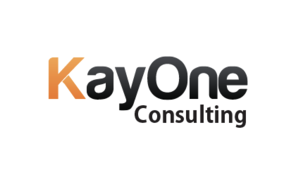
How to Write a Care Agency Business Plan
Table of Contents
Introduction
The home care service landscape has become one of the fastest-growing sectors in healthcare. Globally, people save money by getting care in the comfort of their homes. Also, chronic disease prevalence, medical advancements, cost-effective treatments, and flexibility of home care continue to drive the revenue growth of this industry.
On a global scale, there has never been a perfect time to lay the foundation of a home care business to serve millions of baby boomers. The world has a growing aging population of boomers. It means the demand for home care services will continue to increase. So, draft a practical and actionable business plan template and think of it as a foundational stepping stone to start your home care agency.
Let’s take a look at the basics of home care service mode, how to draft a basic care agency business plan, and follow in the footsteps of some of the best home care agencies across the world:
Basis of Home Care Agency Services
Home health care businesses revolve around basic services targeted to the elderly to meet their medical and non-medical needs through professional caregivers and medical experts at their homes. From checking blood pressure to wound care to monitoring someone’s mental state, home care services are expansive and cost-effective.
The idea is to provide convenient daily home care services to millions of people around the world. Most of these individuals are elderly and suffer from chronic illnesses. In some cases, the elderly are bedridden, disabled, or dealing with Alzheimer’s disease.
Home care services have become ideal for senior citizens or people who leave the hospital. Caregivers also play a crucial role in providing seamless care services and offering daily assistance services.
In layman’s terms, home healthcare allows professional caregivers and medical professionals to visit people’s homes and render a specific care service or assistance. In the last few years, home care services have become more diverse and can involve different types of services for different individuals.
[monsterinsights_popular_posts_inline]
Increasing Demand for Home Care Services
Throughout the world, millions of folks are employed in different home care services. In the United States alone, close to 2 million employed people work in thriving home care services. Home healthcare workers consist of therapists, personal care aides, and nurses.
Market research shows that home care service agencies are on the right track and will drive the healthcare space for years to come. By 2026, expect home care service revenue to hit over $140 billion. If you want to write a solid care agency business plan, you need to adopt and embrace the best practices and follow standard guidelines to start a growth-driven home care business.
With an increase in life expectancy across Asia, Europe, South America, and North America, there is bound to be more need for long-term home care services. And that means care agencies will require more private caregivers to meet the increasing demand. Apart from aging boomers – a higher mortality rate is another reason to dive into home care services.
Type of Care Services Agencies Can Offer
Home care services revolve around assistive care or medical treatment for people who don’t need hospitalization. A professional caregiver or medical professional pays a visit to, say, an elderly at home to offer care or assistance.
The most common home health care services revolve around speech therapy, skilled nursing, and physical therapy. In most instances, it also includes assisting the elderly with daily activities like eating, dressing, and bathing.
Don’t Confuse Medical Home Care with Non-Medical Care
Before you draft a legit home care business plan, differentiate between medical home care and non-medical care.
- Medical Home Care: The medical-based home care involves wound care and related nursing services like monitoring mental health and blood pressure. Recently discharged senior citizens from a hospital require this care.
- Non-Medical Home Care: As the title suggests, it refers to home care that isn’t medical-driven and involves caregivers and other non-medical personnel.
The focus of non-medical home care services is to provide day-to-day essential assistance. For instance, home care aides can take care of the house, prepare meals, and dress and drive individuals in need to doctor’s appointments.
Essential Elements and Considerations to Write a Care Agency Business Plan
There are many steps you can take to draft a business plan and start a new care agency. Since it is a competitive industry, starting and running successful healthcare services can be difficult. Home care services require businesses to be proactive and be part of the industry. But it often makes working in this industry stressful for home care businesses.
Here are the basic steps you can take to write a care agency business plan and kick-start your journey:
Choose an Appropriate Business Name
Selecting a business name may sound something so simple, but it can impact the growth trajectory of your home care agency. The last thing you want to do is choose a bold or inappropriate name that might put off clients. Instead, choose an inclusive and diverse name and confirm it is available so you can use it on brochures, business cards, and letterheads.
Research Different Elements When Creating Home Care Business Plan
A major part of your business plan requires researching and considering various elements to draft a viable, practical, and growth-driven home care business plan. Make sure your research process is strategic and avoid generalizations that might put you in a tough spot.
Instead, create a home care business plan that can help you navigate the different steps of creating a care agency and allow you to move forward. Despite the business plan format, consider elements that might significantly increase or decrease the cost of your agency care operations.
For equipment costs, consider expenses like:
- Nursing supplies
- Office Supplies
- Rental expenses
- Office equipment
- Business development costs
Once you consider all the required expenses to start and maintain home care agency operations, choose a strategy to raise capital . You can secure funds traditionally through small business loans, angel investors , bank loans, or grants.
In the first quarter of starting and running a care agency, consider potential losses and strategies to grow clientele and create a stable billing cycle. So, make sure you have a cash flow to run smooth operations for at least the first quarter of your new care agency.
Choose a Suitable Model for a Care Agency
Your first step is to figure out the most suitable way to get into the home care service business. Your business plan should revolve around creating a new agency from scratch. There might be higher risks and lower business costs.
In any case, conduct thorough research to better understand current industry trends and standards. You can simplify your business plan by acquiring an existing care agency. While this involves more costs, it incurs lower risks.
One of the barriers to entry is when you invest in a dedicated franchise. While it is also a popular and proven business model, it involves higher entry costs. Just to be safe, talk to a lawyer or broker with experience and expertise in franchise law. Remember, you can start a new care agency or acquire one.
Follow Standard Guidelines While Writing Care Agency Business Plan
The business plan will serve as the foundation of your care agency. When writing a care agency business plan, focus on the following elements:
Executive Summary
Write a brief overview of your home care agency.
Services Offered
Explain the type of home care services you will provide clients with competitive pricing.
Company Description
Establish the mission, vision, and goals of your care agency.
Management Plan
Note down the details of care agency ownership and hierarchical structure.
Marketing Plan
Write down ways people can learn about your new care firm.
Financial Plan
Draft the financial statement and break down the balance sheet and cash flow forecast details. You should also run break-even analysis calculations and write down details.
Operational Plan
Include information about staff and facilities and how many supplies you’ll need to run day-to-day operations.
Get the Relevant Certifications and Licenses
No matter where you want to start a home care agency, you will have to comply with the rules and regulations of that region and country. Typically, each country requires home care agencies to get a certified license to operate and maintain all documentation to run legit home care operations.
If you’re unsure about your country’s home assistance and care service requirements, reach out to the Health Department. You should also research and find out if there are certain laws or regulations that instruct care agencies to provide physical therapy, nursing care, occupational services, or language-speech pathology services in a particular way.
You risk making your home care agency business model unorthodox without licenses and certifications. In fact, it puts you at odds against the regulatory authorities. In each country, people have to meet the criteria to receive home care services. So, don’t forget to research basic requirements and note down specific laws that might propel you to change your approach to provide a specific home care service to clients.
Perform Market Research and Analyze Competitors.
The home health care industry is highly competitive. Identify key competitors and run a comprehensive industry analysis. Your focus should be to better understand your competitors’ strengths and weaknesses. And spot opportunities that may favor your home care agency over others to target customers.
The more you understand local markets and close competitors, the better chances you will have to secure funding for your care agency. Focus on the home care service factors that your competitors are unable to meet and provide those care services with added value.
Competitive drive is high when you’re competing in a saturated community. So, run a thorough competitive analysis to improve recruitment and marketing strategies. It will help you identify potential pitfalls and opportunities to better penetrate the home care service target market.
Recruiting and Staff Management
In the home care business landscape, your staff becomes your product. After all, hired employees render service to the elderly under different conditions. It is critical to hire the “right” people to represent your care agency and provide services professionally. Make sure the people you hire can consistently provide high-value home care services to a diverse range of clients.
You can hire an experienced clinical supervisor. Also, understand that some countries require care agencies to hire only registered nurses with at least one year of experience and proper clinical supervision. So, note down added support you should give to hired staff in your business plan. It will also make it easier to manage personnel and expand your capacity to offer services to more clients.
Cover Banking and Payment Information
In the digital age, you can automate and streamline payment processing for your home healthcare service clients. Make a note to create a separate business checking account to ensure professional and personal accounts are not mixed. It is also an effective way to secure your business and personal assets. You should also learn the process to get business credit to support credit card payments.
Get Insurance Coverage
In the quest to protect your home care agency, prioritize getting insurance coverage., Note the type of insurance coverage you need for your home care agency. In most countries, you’ll need to get professional liability insurance. It protects your care agency from malpractice, incompetence, and negligence claims. While it depends on the home health care service agency provides, get general liability insurance that offers protection against claims related to third-party property damage or bodily injury.
Create a Robust Financing Plan
Financial stress is the bane of every company’s existence. So, ensure you have a comprehensive and accurate financing plan in your arsenal. Many business plans note down financing elements throughout the document to iterate the impact of different financial elements like balance sheet and cash flow.
Also, tie together financing elements and note down how they can help you perform better in the market in the first year. Right off the bat, you’ll realize the need to free up your cash flow to support more operations. Factor in financing elements that might help you run optimized operations and grow your care agency faster.
Highlight Sales and Marketing Strategy
Like any business, cover all the marketing and sales details when you plan to start a new home care agency. When operating in a service-based home patient care industry, you need to adopt progressive measures to make your sales and marketing strategy work.
Note down elements that can personalize your marketing efforts and increase your sales. Like a financial forecast, this should be one of the comprehensive sections of your home care agency business plan. Start by researching and identifying close referral sources in your area. It can include:
- Medical home care entities
- discharge planners
- elder law attorneys
- physical rehabilitation centers
- trust fund bank officers
- estate planners physicians
- geriatric care managers
Remember, the success of your care agency depends a lot on how you create and implement your sales and marketing strategy. If you promise efficient and cost-effective home care services, you have to stay on your ground and live up to all clients’ expectations.
For marketing purposes, note down the elements you want to include in your care agency site. If you want to cater to clients in the home care industry, you will have to promote your site to communicate basic information.
Focus on strong promotional content that communicates your techniques while providing different home care services. You may have to adopt more than one sales strategy to run multi-faceted home care agency operations.
One can use your business site to show potential clients how you stand out from other home care service providers. You can also join local community organizations to expand your overall reach. When you join local associations and groups, you will be able to access more clients in need of prompt and professional home care services.
Add Detailed Procedures and Policies
Last but not least, write down detailed procedures and policies in your agency care business plan. Your policies should revolve around providing home care services in different conditions.
For starters, highlight details about the orientation, hiring practices, payroll management, customer responsibilities, customer rights, different home care plans, the process of new client admission, the framework to follow planned schedules, steps to bill clients, and training guidelines.
Final Thoughts
Today, research options and tools have made it easier and faster to create a long-term care agency business plan and offer diverse and effective home care services that cater to the needs of the elderly. But before you even think about expansion funding, business sustainability, and startup security, you need to curate a solid home care agency business plan.
Crunch the numbers and gain a clear market perspective to stand out in the competitive home care service industry. With a comprehensive and clear care agency business plan, you can prioritize the individual needs of your home care service clients.
Don’t let a lack of a solid business plan hold you back from reaching your goals. Contact us today to see how our experienced team can help you create a comprehensive plan that will set you up for success. Don’t wait, take the first step towards reaching your full potential and schedule a consultation now !

- Leading in the Post-COVID World
- Leadership Development
- Top C-Suite Interviews
- Women in Leadership
- Career and Learning
- Corporate Governance
- Culture & Lifestyle
- Legal Services
- Future Series
- Accelerator Series
- Emerging Ideas
- Design Thinking
- Business Model
- Latest News
- Digital Transformation
- Artificial Intelligence
- Blockchain & Crypto
- Big Data & Analytics
- Computer & Software
- Internet of Things
- Business Mobility & E-Commerce
- Industry 4.0 & Manufacturing
- Product and Service Reviews
- Home Improvement
- Strategic Spotlight
- People Management
- Remote Work
- Organisational Change
- Crisis Management
- Global Business
- Luxury Strategy
- Personal Finance
- Social Media
- Business Process
- Transportation & Business Fleet
- Succession Planning
- Climate Change & Green Business
- Social Impact
- Health & Wellness
- Top Executive Education with Best ROI
- Interviews with Directors and Faculties
- Executive Education Calendar
- Programme Highlights
- Success Stories
- Industry Insights
- Programme Directory
- Executive Education Q&As
- The Hamilton Mann Conversation: Digital For Good
- Fernanda Arreola – Inclusive Innovation: Rendering Change Accessible
- Simon L. Dolan – A Future Shaper
- Hervé LEGENVRE – EIPM Research on Technology and Collaboration
- Mapping the Future of Business with Jacques Bughin
- Adrian Furnham – On Your Head
- Kamil Mizgier On Navigating Risk Frontiers
- Delivering Innovation – Accenture Research
- The Better Boards Podcast Series
- Best Partners for Business Growth
- David De Cremer on Management
- Success through the Lorange Network
- A Special Report on AI and Humans by AiTH, NUS Business School
- Surdak on Technology
- Female Leadership In Our Time
- Europe’s recovery is possible. This is how…
- Editors’ Pick
- Business Events Calendar
- Events Partnership
- Travel & Leisure
- Our Mission
- Top Executive Education
- Advertising
- Guidelines for Authors
- Past Covers
- Privacy Policy
- Terms and Conditions

- Entrepreneurship
Domiciliary Care Agency Startup: How To Start Your Business

By George Griffiths
A domiciliary care agency startup is an excellent option for care professionals who want to expand their business and support more people at home.
However, learning how to set up a domiciliary care service and manage teams of workers can be a daunting task!
You may have several questions including:
- How will I find new clients and advertise my agency services?
- What goes into a great domiciliary care business plan?
- Do I have the resources to carry out pre-employment checks on new applicants?
- What registrations and accreditations do I need to get started?
Don’t worry – we’ll answer all of those questions here!
The key to remember is that domiciliary care agency startups are in a great position.
Demand for home-based care is growing rapidly as more people recognise the value of quality support and wish to remain comfortably independent in their properties.
With an ageing population, greater awareness of mental and physical health, and a massive demand for professional care services, there’s never been a better time to start setting up a domiciliary care business.
So, let’s get to work with a checklist of everything you need to know to get your care agency up and running.
Creating a rock solid domiciliary care agency business plan
We’ll start at the beginning – with the plan.
Nothing extraordinary happens without thorough research, and if you have a plan, you can work methodically through each of the steps.
Checklists might not be the most exciting part of building your domiciliary care agency startup, but they’re vital tools to ensure you have all of your ducks in a row.
A business plan is crucial because you’ll need it to clarify what services your agency will deliver, what care staff you need to recruit , and how you will manage the finances.
Your domiciliary care agency business plan needs to include:
- The home care services your agency will offer. That could include companionship, nursing, personal care, emergency support, housekeeping, and help with meals
- When you have pinpointed your services, that will lead your recruitment strategy. The next step is to think about the logistics – will you offer around the clock 24/7 home care, eight-hour shifts, regular visits, or another format?
- How will you protect the rights and welfare of your clients? The best way to do so is to ensure you have clear policy and guidelines for your agency staff to follow, along with appropriate training
Policies cover things like reporting mistakes, recording medications, respecting clients’ dignity, and ensuring good communications with your clients.
The business plan sets the groundwork for the growth of your agency. Once you’ve scoped out the nature of the business and what staff you need to employ, you can get to work on the financials (more on that shortly!).
A business plan is critical since you need to be prepared for Care Quality Commission (CQC) inspections and assessments.
Regulations for setting up a domiciliary care business
Once you’ve got a business plan in place, don’t worry if anything needs to change! Businesses grow and evolve, so you can always expand your services or recruit more specialist staff at a later date.
What you will need to do before you throw the doors open is to ensure you are compliant with all the regulations.
Here are the highlights of the essential points:
- You need a registered manager responsible for everyday agency business and compliance. They must hold a QCF Level 5 Diploma in Leadership for Health and Social Care
- The owner runs most domiciliary care agency startups, but you can employ a manager to do this for you. There are older qualifications, such as the Registered Managers Award (RMA), which aren’t available anymore but are accepted by the CQC
- Care staff must have a Care Certificate – if you intend to deliver care yourself, you must also have completed this training
Along with staff training requirements, you’ll need to register with the CQC if in England, The Care Inspectorate if in Scotland, or the CSSIW if in Wales.
That registration is a legal requirement of the Health and Social Care Act.
Although it takes a bit of time to complete a CQC registration, it does mean that you demonstrate your agency has the right qualifications, experience and management to deliver outstanding care.

The practicalities of how to set up a domiciliary care service
So we’ve covered registrations, business plans, training and policies – but there are other practicalities to think of before your brand new domiciliary care agency startup is ready to go!
You will need legal insurance, with most home care agencies opting for:
- Employer’s liability cover
- Professional indemnity insurance
- Public liability policies
- Medical malpractice cover
- Insurance against treatments liability
Most industry insurance providers offer packages for care agencies, so you won’t need a raft of different policies to be fully covered.
Next up, you will need some equipment, and make sure this is added to your budget for outgoings such as:
- CQC registration fees
- Insurance cover
- Staff wages
- Advertising costs
- Software for care agencies
- Training for you or your staff
- Renting office space (if not working from home)
Equipment usually means a lockable safe for care records since these contain confidential information. Alternatively, you can use care agency software to manage all your documents.
Agency staff need care uniforms, although you can ask them to supply their own. If so, you will need to decide what the uniform consists of, identify local suppliers, and produce photographic ID badges.
PPE is also essential, so you’ll need to budget for gloves, aprons, and any other protective clothing your agency staff require.
Financing your domiciliary care business plan
Finally, we need to talk about money and cash flow. There are a vast range of ways to provide a capital injection to cover the initial training, registrations and recruitment costs, such as:
- Startup business loans
- Personal investments through savings
- Business lending
When you have a budget, you’ll need to publicise your agency on two fronts – finding staff and finding clients.
Great quality care workers are vital, so you’ll need to decide what pay you are offering, the minimum qualification requirements, and which portals or platforms to advertise vacancies on.
Don’t forget about the Care Certificate training requirement and the need for an Enhanced DBS C heck with other background verifications before you take on any new staff!
Finding clients is also possible in several ways – depending on whether you’re advertising to private clients or bidding for care agency contracts through your local authority.
Bear in mind that private clients tend to pay far better rates, and you can advertise by:
- Creating a website and having a social media presence
- Physical marketing through posters and leaflets
- Opting for traditional local advertising in the press or magazines
- Referral marketing, by establishing a relationship with local healthcare services which can recommend your agency for people looking for home care
Once you’ve got your advertising underway, it’s time to take a breather, take stock, and get back to that domiciliary care agency business plan to figure out your next move!
This blog was originally published by uRoster
About the Author

George Griffiths is a Group Managing Director at uGroup. He has been brought up to know the values of uGroup ever since his first involvement in our family-run business at the age of seven. Alongside the leadership team, George is responsible for developing and executing the group 10-year strategy plan in line with our mission statement ‘to always care about getting it right’.
RELATED ARTICLES MORE FROM AUTHOR

How to Turbocharge Your Startup Growth

How a Certified Public Accountant Can Help Maximize Your Business’s Financial Health

The Brain Hack You Never Knew You Needed

Navigating The Challenges Of International Business Relocation

Europe Must Invest in Technology, Talent, and Trust to Realise the Potential of Generative AI

Top 7 Service Business Ideas with High Demand
Leave a reply cancel reply.
Save my name, email, and website in this browser for the next time I comment.
AI & Big Data Expo North America
Responsible business europe 2024 (london, june 11-12), international hrd summit 2024, curious2024 – future insight™ conference, global ev & mobility technology forum, 2024 world battery & energy storage industry expo (wbe), reuters events: sustainable transport 2024 (3-4 september, amsterdam), the conversational ai innovation summit 2024, 2024 learning impact conference, meet us in london – university of st.gallen (hsg), mba experience event – ghent campus – vlerick business school, hr day 2024 – vlerick business school, online mba info webinar – swiss business school, ventureday 2024 – innovate to elevate: get future ready by embracing technology and sustainability – cranfield school of management, the global research conference on caste, business and society – university of bath school of management, the cranfield ai masterclass series – supply chain 5.0 and ai – cranfield school of management, featured articles.

How Top-Performing Firms Needed to Reorganise Seven Times for Digital

Unlocking the Power of AI Leadership: A Dialogue with Professor David De Cremer

How to Put Curiosity to Work in Your Organisation

How AI Liberates the Transition to a Skill-Based Organisation

Leading the Gen AI Revolution: Building Workers’ Trust to Reinvent Work in Europe

Aligning Organisational Ecosystems to be Fit for Purpose

Generative AI Update for 2024

Longevity for Sustainability: Adding Value That Lasts

Magnetic Loyalty: Crafting Effective Loyalty Programmes that Attract and Retain Customers
Future series.

Navigating the AI Labyrinth: User Control as the Guiding Light

Exploring the Role of AI in Healthcare Marketing

Struggling to Implement AI in Your Business? Read this


Augmented Intelligence: How AI Will Enhance, Rather than Replace, Human Expertise

What Does EVhype Teach Us, and How Can We Consider the Lessons in AI’s Development?

Energising Together: The Art of Unleashing Collective Potential

Platform Thinking: What Established Firms Can Learn From Big Tech and Digital Start-Ups

Part B: Designing Organisational Ecosystems and Overcoming Barriers to Implementation
Strategy & management.

Time Sensitive Snapchat Understanding Ephemeral Content and Its Impact

IG Highlight Viewer Maximizing Engagement and Insights on Instagram

Dynamic Image Templates + Omnichannel Ecomm: A Marketing Duo Worth Drooling Over

Native Ads Unleashed: The Unobtrusive Approach to Web Monetisation
Upcoming events, privacy overview.
0800 059 9908
Speak to us
KNOW THE BUSINESS
- Domiciliary Care
Setting up and running a successful Home Care / Domiciliary Agency: what you need to know and do.

Home Care Agency / Domiciliary
While home care is a growing field with strong profit potential, it also demands a lot of care and forethought. Even though your business is essentially an agency working without medical facility walls, you are still providing regulated services, which come with significant risk exposure. In order to succeed, you have to take many steps to lay the right foundation for your business.
As an agency that provides a regulated activity, you are required by law to register with the relevant regulator within the country you are operating. These are the Care Inspectorate in Scotland, the Care & Social Services Inspectorate Wales (CSSIW) in Wales and the Care Quality Commission (CQC) in England. To get started, it is essential to have the right policies and procedures in place to ensure that you successfully register with the regulator, and are able to pass future inspections. You have to adhere to several regulations.
When starting any new business, there are many things to consider and many pitfalls to avoid. Launching a domiciliary care agency can arguably be an even more daunting task, with the added burden of registering with the Care Quality Commission.
At Care Agency Media, we provide our clients with the tools and the resources they need to start and run a successful home care agency business.
Setting up a Home Care / Domiciliary Agency
To run your business smoothly, below are a few things you need to consider when setting up a domiciliary agency., business registration and set up.
- Start-up Costs
- Branding your business
- Business Planning
- Compliance & Regulations
- Systems & Software – Invoicing, Payroll, Accounting, CRM, Shift Management etc
- Website & Emails
- Social Media Set-up and Management
- Recruitment Marketing
- Client Marketing
- Staff Training and Appraisal
- Marketing material
- Staff Uniforms
- Operations Set-up
- Operations Training
- Cashflow Finance
- Mentorship/Support
- Business Forms & Documents
- Business Policies & Procedures
Our Startup Package
From £1943 - £7945.00, crafted by industry and business experts..
Accelerate your agency business and save yourself from the overrated ‘trial and error’. Get it right the first time with our comprehensive package, which has everything you will ever need to set up, build and grow a successful Home Care Agency / Domiciliary agency business.
What the package includes
- Company set up
- Compliance and Regulations
- Systems & Software Support
- Referrals Marketing
- Referral for Subcontracting
- Recruitment Process
- Social Media
- Email Accounts
- Shift Management Software
- Payroll & Accounting Systems
- Recruitment Management
- Compliance Management
- Branded Documents
- Branded Policies
- Branded Business Forms
- Training and Support
1. Set-up, Registration & Information
Business plan.
We co-create a comprehensive business plan for your new business, which includes a cash flow forecast as well as a profit and loss statement.
NAME STORMING
We help come up with a great name for your business which is catchy, appropriate for your business type and easy to remember.
COMPANY REGISTRATION
We register your company with Companies House, and provide you with a postal as well as a digital certificate of incorporation.
REGISTER AS AN EMPLOYER
Your company is registered as an employer with all relevant authorities, including for Pay-As-You-Earn (PAYE).
IT SET-UP SUPPORT
We provide guidance on the kind of equipment, tools, and resources you need for your business to succeed in the digital space.
REGISTER FOR CORPORATION TAX
At company registration your company is automatically enrolled for corporation tax with HMRC, so you can rest assured you are covered from the get-go.
OFFICE SPACE SUPPORT
We offer guidance on reputable providers as well as perform an office search in your location.
REGISTER FOR VAT
Where required, we will register your company for VAT.
SUPPORT WITH NMC
For checking the register when employing or revalidating nursing professionals.
TELEPHONE REDIRECT
We help you set up a virtual telephone number in no time.
DATA PROTECTION REGISTRATION
In line with your business' legal obligations, we register your new organisation with the Information Commissioner's Office (ICO). We cover your first yearly fee of £40.
Information And Guidance
- Business Overview Guide – This gives you details about the temporary staffing business, helping you understand the ins and outs of it all.
- Limited Company Regulation Guide – Provides the legal framework of setting up and running a business as a limited company.
- Directors Responsibilities Guide – Provides guidance for the director of a business in the UK.
- Trade marking Guide – Provides an understanding about trade marking your business.
- Tax & HMRC & Self Assessment Guides – Provides an understanding for your tax responsibilities.
- Bank Account Set-up Guide – Provides guidance on opening up a suitable bank account.
- Insurance Guide – Provides guidance and information on setting up suitable insurance for your business as well as list of providers.
- Office Health and Safety Set Up Guide – Provides you with a list of your obligations in a poster format.
- Information about how to use Business Cards effectively.
- Information about how to use Compliment Slips.
- Information about how to use Letterheads.
2. CQC Registration
Completion of forms, guidance & CQC Support
We provide advice and guidance on CQC registration, regulations and monitoring. We also help with the completion of the application forms for both the new provider and the registered manager, as well as the preparation of the statement of purpose. We will review the CV for the Registered Manager & Nominated Individual to ensure they meet the CQC requirements.
We assist in:
- Reviewing Registered Manager CV
- Providing all CQC application requirements,
- Liaising with CQC for further requirements and supporting documentation,
- Responding to CQC post-interview requirements
3. CQC Interview / Inspection training & preparation
We supply a day’s training in preparation of CQC interview and to ready your company to provide the service, covering the fundamental principles the the CQC Key Line Of Enquiry, as well as the following:
- Team Assessment
- Manager Assessment
- The Provider’s Role Outline
- The Nominated Individual’s Role Outline
- Office Evaluation and Recommendations
- Health and Safety Assessment
- Office Risk Assessment
- Evaluation of Filing and Data Management
- Recommendations on How to Set Up the Relevant Files
- Evaluation and Verification of Documents and Readiness to Provide Service
- Registered Manager Interview Coaching, Mock interview and advice
- Question and Answer Session
4. Branding
We help our clients build relevant, credible, differentiated and enduring healthcare recruitment brands, that not only attract potential clients and candidates, but also last for a lifetime.
LOGO DESIGN
We design a suitable logo of your business, our designers have a great deal of experience in designing logos for business in the healthcare sector, we promise to create the right logo concept for your business.
* Our process – We research and come up with a suitable concept specific to your business, which we share with you and if you are not happy with the concept we will provide further concepts based on your feedback and input.
BUSINESS CARD
We design a business card for your business and we customise for up to 5 staff names.
*Please see the printing section for the number of business cards printed with the package.
We design a professional letterhead for your business based on your logo concept and branding guidelines. You will also be provided with a Word version of the letterhead.
COMPLIMENT SLIP
We design a professional compliment slip for your business based on your logo concept and branding guidelines.
We design a professional ID badge for your business based on your logo colours, concept and branding guidelines.
EMAIL SIGNATURE
We design your professional business email signature. All signatures are customised for all the email accounts we create and the signature is easy to use and edit….
Domain Name Registration – We register your business domain (e.g. www.yourcompanyname.co.uk) name on your behalf. * You have rights to your domain name and have full access to manage it from your control panel.

GET THE PRINT VERSION
Tired of scrolling? Download a PDF version for easier offline reading and sharing.
Get Started
Let us help you get your business started today. Ring us or click the button below and we will talk you through the process and get you started in no time.
We do not only create a website for your business, but we also create your business on your website.
• Domain Name Registration – We register your business domain (e.g. www.yourcompanyname.co.uk) name on your behalf for 1 year. * You have rights to your domain name and have full access to manage it from your control panel.

Website Features
- Professional & Clean Design
- Quality Content
- High-quality Licensed Images
- Worldclass User Experience
- Social Media Integration
- Application Form Download
- Time Sheet Download
- Admin Panel (easy to edit)
- Testimonials
- Additional Document Download
- Online Application
- Traffic Reporting
- Online Application Form
- Job Listings
- Conversion-focused
- Emailing Portal
- Online Signature
- Unlimited Pages
GDPR (GENERAL DATA PROTECTION REGULATION) COMPLIANCE
By having your website designed and developed by Care Agency Media, you are assured that it meets GDPR requirements. We ensure we build in all the relevant features, as stipulated by the GDP Regulation, covering, explicit consent, e.g. cookies notifications, privacy by design, open channel for user requests, etc.
WEBSITE HOSTING (FREE FOR 1 YEAR)
Our hosting service provides a safe and secure hosting environment that protects your business and your assets. Below are the hosting features that come with the package. Cpanel hosting – as the website owner you are able to manage your website from a web-based interface.
Your website is protected against malware that otherwise could be on your website for months without you detecting it.
SSL CERTIFICATE
Using HTTPS protocol provides a certain dose of credibility in your visitor’s eyes, trust that you know what you’re doing and that you respect their security and privacy. * Free for one year, then £39/year

6. Email Accounts Set-up
All your email accounts are set up and ready to be used, with relevant email signatures for you to use instantly with less hustle. Email accounts area set with supreme logic for your typical agency business to ensure convenience and smoother operations.
*Max mailbox size depends on email hosting package type. Email Features
- Email Accounts – 10
- Email Forwarding – 10
- Email Autoresponders – 10
- Max Mailbox Size – 5GB*
7. Online File Storage Set-up
All your files will be available online on a secure, reputable online file storage system that would allow you to access your business files from anywhere in the world, with an internet connection….
8. Recruitment/Staff Forms & Documents
We create neatly presented, fresh and branded PDF forms and policy documents for your agency, designed for your requirements, boasting the latest features in fillable PDF form design. 60+ forms included, see separate index for the forms we provide.
For Comprehensive Care Policies & Procedures
The most comprehensive and compliant management policies, procedures, documents and forms for the health and social care sector on a convenient document management system. Stay compliant and worry free with our reliable, comprehensive policies and management forms.
9. Home Care Forms & Documents
We create neatly presented, fresh and branded PDF Home Care Forms and documents including Assessment, Care Plans, Risk Assessment, Care Management and Medicine Management Forms for your agency. These forms are designed for your requirements, boasting the latest features in fillable PDF form design. 40+ forms included, see separate index for the forms we provide.
10. Marketing Materials
• Recruitment Leaflet • Client Leaflet • Company Brochure • Tri-fold Brochure • Company Folder • Client Introduction Letter • Roll-up Banner • Business Door Sign/Advert (All the above materials are customised for your company by our talented and experienced designers, the copy is also written for you, you also have ownership of these files including source files.)
11. Policies
High-quality, well-designed, well-branded and up-to-date company PDF policy documents ensure your business is well set out. See Appendix for list.
12. Sales & Marketing Resources
• Marketing Strategy (in the business plan and guide) • Sales Strategy (in the business plan and guide) • Sales Letter (email and Word document) • Email Marketing Tools Set-up • Sales Email Templates (Dashboard) • Telesales Script
13. Social Media Set up
• LinkedIn • Google Business Location (The 2 accounts above are setup and branded for your business).
14. Outset Marketing & Sales
- SEO – Directory Listing (UK-20)
- Recruitment Campaign Set-up (Indeed)
- Recruitment Strategy Implementation
- Social Media Campaign Set-up
- Care Homes Marketing Data List (c. 550)
- Telesales Campaign on a List of 200 Care Homes
- Client Marketing Strategy Implementation
*SEO – The type of SEO we perform is intended to boost your website’s presence online, but not to get you to the top of any search results. We provide a separate guide on SEO Marketing and services. * On site SEO
15. Operations & Admin
Operation tools set-up.
- Invoicing – We recommend software and set up for you.
- Payroll – We recommend software to use and service provider options.
- Client management (CRM) – Recommend software to use.
- Filling – Guidance and Training.
- Accounting & Book keeping – We recommend software to use and also refer you to accountants.
- Targets & Goals – Guidance and training.
- Sales – Strategy Consultation.
- Marketing – Strategy Consultation.
- DBS Checks – We recommend a company to use for checking your staff DBS.
- Staff training – We recommend a company to use to train your staff both online and off-line.
- Nurse Revalidation – We recommend a company to use for appraisals and revalidation.
- Compliance / Occupational Health – We recommend a company to use for processing your staff compliance.
16. Referrals
- Uniform Suppliers
- Business Insurance
- Staff Training
- Business Solicitors
- Invoice Factoring – Cashflow finance
- Compliance Memberships
- Sub-contracting Vendors
- Accountants
We provide a list of recommended providers, based on our research.
* We are not in any way affiliated with any of the organisation and software providers we recommend, we have come up with these recommendations based on our research and/or experience of using them, you are free to engage any other providers you prefer.
Temporary Staffing Agency Management Software

Are you looking for a new powerful way to manage your temporary staffing agency? Agency Portal is an intuitive platform, with real-time updates, automated timesheets, invoices and earnings for Payroll. Save time, money and get more control over your business.
Training & Development
We provide training workshops covering various aspects of the business, including the topics below. The training workshops are an hour each with pre and post reading material to ensure you understand the subject. The sessions are held online via video conferencing and your relevant company delegates should attend. The workshops are staged during the progress of your project depending on the structure of your project
Getting Into Business (GIB)
This is a workshop for anyone starting a business. It is aimed at directors and proprietors to cement their vision of setting up a successful business. The workshop involves the business owners reviewing their drive…
Understanding Finance & Accounts
The future viability of your service depends on good financial management that you exhibit today. This workshop breaks down the financial framework of your business, delivering …
Marketing To Your Market (TS)
Marketing is as important to your business as oxygen is to your body. Getting clients is key to your business, it is important that you are aware and that you have a clear marketing plan to implement in your business.
Recruitment & Staff Compliance
A comprehensive 2 hour workshop for Nominated individuals and/or company directors for companies providing regulated activity including Domiciliary care, Supported living…
IT & Software For Your Business
Learn and understand the technologies that you need to use for your business. From website, email, business management software, invoicing, online file storage and document management .
Your Service, Your Success
This is a workshop for Nominated individuals and/or Company directors for providers regulated activity including Domiciliary care, Supported living and Children Service and Care Homes and more
Managing Service, Managing Self
A comprehensive workshop for Registered Managers for regulated services including Domiciliary care, supported living and Care Home.
Understanding CQC
Our introduction to CQC training covers all of the key areas that need to be addressed to comply with CQC Fundamental Standards, Key lines of enquiry, six population groups, evidence for pre-inspection, inspection day, and post-inspection.
Service Insights ( Adult Services Workshop )
A guide for running a domiciliary care/Supported Living business, outlining what’s involved on a day-to-day basis. Reflection on regulations, compliance, processes and procedures.
The Practical Guide (DC)
A hands-on workshop taking you through the practical process of dealing with clients, focusing on understanding your clients, the assessment process, dealing with assessment visits, preparing care plans and more.
Introduction to Safeguarding
The aim of the workshop is to ensure you understand how the duties and responsibilities under the Care Act apply in practice, explore the difficult balance between safety and choice and control for individuals as well understand the law governing information-sharing.
Service Insights (Adult Services Workshop)
A guide for running a domiciliary care/Supported Living business, outlining what’s involved on a day-to-day basis. Reflection on regulations, compliance, processes and procedures.
Interview Preperation (CQC/RQIA/CIW/CIS)
This workshop is for Registered Managers and/or Nominated Individuals to help them understand the responsibilities that make up each role. We will reflect on the underpinning regulations that you must be aware of as a provider and discuss the CQC fundamental standards,
18. Printing
As part of the package we provide printed material with the following quantities:.
- Business Cards: (2 sets 250
- Client Leaflet: 1000
- Staff Leaflet: 1000
- A3 Poster: 10
- A4 Folders: 250
- Letterheads: 1000
- Compliment Slip: 1000
- Time sheets: 1000
- Company Brochure: 100
- Roll-up Banner: 1
* If you wish to have more printed materials beyond the package,we can provide a quote for that. * ‘We always thrive to provide the best quality paper for the printed materials although stock may vary
19. Other Resources Provided
- Marketing Data – ± 600 entries (Regional/County or radius based)
- Uniforms – 12 – 20 (12 tunics or 22 Polo T-shirts)
- ID Badges – 20 x ID Badge Printing Credits (You order ID Badges for 20 staff as you recruit)
- Health & Safety Poster
- First aid kit – Fulfilling Health and Safety Executive content recommendations for your workplace, which includes:
- 1 x Guidance Leaflet
- 20 x Washproof Plasters
- 2 x Eye Pads with Bandage |15
- 4 x Triangular Bandages
- 6 x Safety Pins
- 6 x Sterile Dressings 12x12cm
- 2 x Sterile Dressings 18x18cm
- 6 x Moist Wipes
- 1 x Pair Disposable Gloves
20. Support
As part of the package, we are available for a full year to support you in running your business answering any questions you may have, resolving some issues you may encounter. Our support package covers:
- Business related issues
- Technical issues excluding hardware
- Website support and maintenance*
- Social media management* 6 months

Business and Other Support
Any queries or issues your business may face, our consultants are on hand to provide support and, where required, we will signpost you to the relevant provider. Marketing Tips, diversification, growth, recruitment and getting clients, operations, administration etc. – you can count on us to be there for you for the first 12 months of you business. Beyond the first 12 months, if you still need some form of support, we can offer a tailored solution for your needs. * Note that our support is mainly provided via an efficient online support system, where we can easily track issues, as well as WhatsApp and Phone.
18. Website Support & Maintenance
We update many websites every month for clients who understand the importance of keeping their website’s updated regularly. By using our services you can be assured of receiving a high level of service and have the peace of mind in knowing that your website is in safe hands. It will need ongoing management, updating and refining. Updating your website from time to time ensures that your ranking with search engines, like Google, improves over time.
We offer website maintenance and management programs that are professional, inexpensive and take care of your entire web support needs. We work with you to ensure that your website provides accurate and up-to-date information to your visitors. Our monthly website maintenance and management packages are designed to be as simple as possible whilst offering the very best in value for money.
With the package you get the following:
- Website support
- Hosting support
- Email management
- 24hr Response Time
- Fixing Broken Links
- Website Back-up
- Website Restoration on attack
- CMS/plugin updates
- Web form testing
- Incremental cloud Backups
- Uptime Monitoring
- Security Check
- Monthly Reports
- Monthly Google Analytics Report
* Website Maintenance and support – £20/month or £220/year, you will receive a renewal reminder and offer when your 1year free support expires so you can choose a suitable package for yourself. As mentioned, with the package, you get a year free.
Social Media Management
- We keep your Twitter & Facebook active with 3 marketing messages per week.
- Post 3 days a week one post, social media post to Facebook and Twitter only.
- 6 months social media management is included in the package.
*After 6 months you can choose to let us continue managing your social media for £85/month or you can take over. You will be notified when of this service expires. Other packages are available.

Consultancy
Helping you solve challenges in business.
We are committed to supporting you to develop your business. Whatever challenges you may face in your business journey, our consultants know a thing or two about it and can help you resolve them. Our expertise and experience have supplied us with the specific tools that can help improve your business and deliver the results you desire. Here are some of the consultation services we offer with this package.
Business Optimisation Consultation
Efficiency is about making the best possible use of resources, overtime we have realised that there is a positive correlation between efficiency and profitability of healthcare agencies.
Marketing Consultancy
One of the most critical aspects to your success in healthcare business largely rely on the efficiency and effectiveness of the processes you implement to get your message across to your potential customers.
Recruitment Consultancy
Firstly, our consultants bring a wealth of knowledge, industry experience, frameworks, models and tools to help you in developing, robust solutions for all your recruitment related needs.
General Business Issues
Running a care agency business is a fulfilling and rewarding, but challenging process. Disruptive and unexpected events that threaten to harm people or property, seriously interrupt operations, damage reputation, or impact the bottom line may occur.
Strategy Consultancy
A business strategy is a set of competitive moves and actions that a business uses to attract customers, compete successfully, improve performance, and achieve organisational goals, this is not an easy task.
Operations Consultancy
We have experience and knowledge on how the best businesses in the sector work, thus can help you identify operational issues within your business operations. Help you find solutions to develop better operational systems to improve profitability and growth.
Bid Handling Consultancy
Utilising years of hands-on experience writing and managing 100s of social care bids, we know what approaches can turn your bid into a winning submission.
Pre-inspection Consultation
From years of experience, we have noticed that Providers who embed a culture of compliance and make provision of high quality care usually achieve positive outcomes, both for themselves and their service users.
Dealing with Safeguarding
We support you in dealing with a safeguarding incident, guiding you through the process of handling the issue at hand as well as dealing with and communicating with stakeholders.
Your Business, Your Way
We can help you set up.
Establish your business in one of the largest, recession proof sectors in the country, with support from experienced industry experts. Over the years we have developed, established tools, resources and expertise to help you set up and run any of the businesses below.

- Supported Living Services
Providing suitable or adapted accommodation within the community.

Temporary Care Staffing Agency
Your company recruits and supplies staff to other established organisations.

Combined Care Agency
Start both a staffing and home care agency and grow in no time with our great support.

Semi-independent Living
Provide accommodation and support to young people aged 16+, helping them transition to adulthood

Children’s Home
A children’s home is a large house where children and young people live together as a group, with professional staff to look after them

Residential Care Home
This is a residential setting where a number of older people live, usually in single rooms, and have access to on-site care services
All round service provider for health and Social care businesses
Starting Up
- Temporary Staffing Agency
- Combined Agency
- Semi-Independent Living
- Children’s Home - (Coming Soon)
- Nursing Care Home - (Coming Soon)
- Marketing Support
- Tender Writing
- Policies & Procedures
- Financing Your Business
- Case Studies
- Terms Of Use
CUSTOMER SERVICE
- Contact Sales
- Request a Call Back
- Client Support
- Your Project
Copyright 2023 © Care Agency Media Ltd, Registered in England & Wales, Company Reg: 11489523.
Privacy Overview
Call us on 0800 059 9908 or complete the form below., we will get in touch..
- Business Startup Consultants
- Business Plan Writers
- Business Mentoring
- Business Growth Consultants
- Customer Case Studies
- Free Business Plan Template

How To Start A Domiciliary Care Business
Kurt Graver June 5, 2022 Business Start-up Advice
Providing compassionate in-home care and connecting healthcare facilities with qualified temporary workers are noble pursuits. But launching these startups comes with hurdles. This comprehensive guide breaks down everything you need to know to get your care business up and running successfully.
Navigating Legal Requirements and Licensing
Unlike starting many businesses, you can’t just open your doors and begin operating a domiciliary care service in the UK. Strict regulations rightfully protect vulnerable people receiving home care.
To legally provide domiciliary care in England, you must register with the Care Quality Commission (CQC) [1]. The application process involves submitting details on:
- Your proposed services
- Business Location
- Staff qualifications
- Policies and procedures
Once submitted, the CQC will thoroughly review your application and likely inspect your business in person. You’ll also need CQC-approved Disclosure and Barring Service (DBS) checks for all staff to show you can legally work with at-risk adults.
After approval, you must pay an annual fee to maintain CQC registration. They’ll continue evaluating your business through inspections and surveys to ensure you meet essential standards. Having robust systems for delivering quality, personalised care is crucial.
Healthcare staffing agencies don’t require CQC registration. But you still need liability insurance, ironclad contracts, and rigorous candidate screening. We’ll cover staffing specifics later.
Selecting the Right Business Structure
Consider if you want to operate as a sole trader, partnership, or limited company.
Sole traders have simpler tax and accounting requirements but face unlimited personal liability. Partnerships allow the sharing of responsibilities and complementary skills between co-owners.
Limited companies separate your personal assets from the business but require more reporting. Many care startups opt for limited company status to limit personal risk.
Just make sure you have solid partnership agreements or corporate governance procedures in place if you choose a partnership or limited company.
Understanding the Costs
Startup costs vary, but expect to budget around £3,000-£5,000 initially. Big expenses when launching your care business include:
- Incorporation fees – Around £100-£200 to formally create a company
- Office space – Budget £200-£500 monthly for a basic office if needed
- Equipment – A computer, phone, uniforms, medical supplies, etc. £1,000-£2,000
- Website – £500-£1,500 for a professional site with SEO optimisation
- Staff – Salaries, training, background checks. At least £2,000/month
- Insurance – £1,000-£2,000 annually for liability coverage
- Marketing – £500-£2,000 for branding, promotional materials, advertising, etc.
Remember ongoing costs like CQC fees, accountants, legal advice, supplies, training, etc. Be realistic with financial projections and seek angel investors or small business loans if needed.
Building Your Care Team
Quality patient care starts with your staff. Legally, a domiciliary care manager must have qualifications like the QCF Level 5 Diploma in Leadership for Health and Social Care [2]. Frontline caregivers need training like:
- Moving and Handling Certificate
- Health and Safety Certificate
- Care Certificate [3]
- First Aid Certificate
- Mental Health First Aid Certificate
Conduct thorough interviews, check references, and vet candidates’ suitability. Implement a robust induction covering your policies, procedures, training, and code of ethics.
For a staffing agency, strong recruitment using platforms like Indeed is essential to build your pool of qualified nurses, carers, therapists, etc. Verify credentials, qualifications, and suitability.
Ensure you have payroll and HR systems to handle scheduling, timesheets, and payments and stay legally compliant.
Crafting Customised Care Plans
Central to quality domiciliary care is developing personalised care plans for each patient, evaluating their:
- Mobility and physical needs
- Healthcare conditions
- Mental health and cognition
- Nutrition requirements
- Personal preferences
- Family dynamics
Care plans should outline schedules, medications, therapies, activities, and goals. Review regularly and update as needs evolve. Detailed care plans combined with regular training help ensure consistent, quality care.
Getting Clients through the Door
Marketing is essential for any new business. With care startups, focus on:
- Networking – Attend local events to meet community partners and referral sources.
- Website – Create an informative site that ranks high in search engines.
- Social media – Share your mission, team, and news on platforms like Facebook.
- Print materials – Well-designed brochures, flyers, and direct mail can help spread the word.
- Referrals – Ask happy customers, healthcare providers, and community groups to recommend you.
- Online reviews – Encourage positive feedback on sites like Google, Facebook, and CareAdviser.
For staffing agencies, market directly to care homes, hospitals, clinics, and other facilities needing temporary workers. Build relationships with HR contacts and demonstrate how you can fill urgent staffing needs.
Overcoming Key Startup Hurdles
While passion for caring for others may be your inspiration, the realities of entrepreneurship present challenges. Be ready to navigate hurdles like:
Identifying the Right Opportunities – Carefully research your local market, regulatory environment, competitive landscape, and demographic needs to identify the right services to offer. Can you fill an unmet homecare need or provide staffing support others aren’t?
Securing Startup Funding – Many startups fail because they run out of money. Realistically project costs and seek loans or investors if needed. Consider crowdfunding sites and small business grants. Bootstrapping requires very lean operations.
Bridging Knowledge Gaps – If you lack experience in healthcare, bring on partners or advisors with clinical expertise. Invest in training. Learn regulations inside and out.
Managing Time and Stress – Entrepreneurship involves long hours and wearing many hats. Set boundaries and practice self-care to avoid burnout. Outsource what you can.
Adapting to Changing Conditions – Healthcare is ever-evolving. Stay poised to adjust to funding changes, rising costs, or pandemic response measures.
With proper planning and support, these hurdles are surmountable on the path to success.
Launch Checklist
Follow this launch checklist to get your care business up and running smoothly:
6 Months Before Launch:
- Choose a business structure
- Research licensing requirements and local opportunities
- Start designing your brand, website, and marketing materials
3 Months Before Launch:
- Officially register your company and apply for CQC licensing
- Open a business bank account and implement accounting software
- Secure office space if needed
- Finalise policies, procedures, care plans, consent forms, etc.
- Start recruiting and vetting staff.
1 Month Before Launch:
- Confirm CQC registration and complete staff onboarding
- Finalise insurance, equipment, and other necessities
- Launch marketing efforts and start taking client inquiries
- Revisit financial projections and tweak as needed
Keys to Long-Term Success
Launching a domiciliary care or healthcare staffing startup has challenges. But with proper planning, an amazing team, and dedication to compassionate care, you can build a thriving business.
Remember, word of mouth is powerful – focus on delivering 5-star care and growing your reputation one happy client at a time. Stay resilient, learn from mistakes, and continue improving. You’ve got this!
With this advice, it’s time to make your dream of starting a care business in the UK a reality. You have the power to provide comfort and independence to those needing support. Here’s to changing lives while also growing a sustainable enterprise. Now go forth and care!
The next step is to develop a solid business plan to submit to the CQC and raise funding. You can either use our business plan template to write your own business plan, or we can help you write your business plan using our business plan writing service .
Related Posts
- Sole Trader Or Limited Company? Which One Is Best
- Marketing For Startups: Our Definitive Guide
- Non Disclosure Agreement
- Business Plan Masterclass
- Business Development
- Business Funding
- Business Ideas
- Business Plan
- Business Start-up Advice
- Business Start-up Guides
- Business Strategy
- Business Success Formula
- Leadership & Management
- Marketing & Sales
- Startups & Entrepreneurship
Need a business plan? Call now:
Talk to our experts:
- Business Plan for Investors
- Bank/SBA Business Plan
- Operational/Strategic Planning
- L1 Visa Business Plan
- E1 Treaty Trader Visa Business Plan
- E2 Treaty Investor Visa Business Plan
- EB1 Business Plan
- EB2 Visa Business Plan
- EB5 Business Plan
- Innovator Founder Visa Business Plan
- UK Start-Up Visa Business Plan
- UK Expansion Worker Visa Business Plan
- Manitoba MPNP Visa Business Plan
- Start-Up Visa Business Plan
- Nova Scotia NSNP Visa Business Plan
- British Columbia BC PNP Visa Business Plan
- Self-Employed Visa Business Plan
- OINP Entrepreneur Stream Business Plan
- LMIA Owner Operator Business Plan
- ICT Work Permit Business Plan
- LMIA Mobility Program – C11 Entrepreneur Business Plan
- USMCA (ex-NAFTA) Business Plan
Franchise Business Planning
- Landlord Business Plan
- Nonprofit Start-Up Business Plan
- USDA Business Plan
- Cannabis business plan
- eCommerce business plan
- Online Boutique Business Plan
- Mobile Application Business Plan
- Daycare business plan
- Restaurant business plan
- Food Delivery Business Plan
- Real Estate Business Plan
- Business Continuity Plan
- Buy Side Due Diligence Services
- ICO whitepaper
- ICO consulting services
- Confidential Information Memorandum
- Private Placement Memorandum
- Feasibility study
- Fractional CFO
- How it works
- Business Plan Examples
Home Health Care Business Plan Sample
Published Oct.12, 2016
Updated Apr.23, 2024
By: Jakub Babkins
Average rating 4.1 / 5. Vote count: 15
No votes so far! Be the first to rate this post.

Table of Content
Home health care business plan for starting your own agency
Home healthcare is an $84 billion industry in the US alone and it is not going to slow down anytime soon. It covers both non-medical healthcare and skilled home health care, teams. Currently, the US has over 386,000 home health care businesses and employed more than 1.7 million people approx. But this home care agency business plan is not for everyone. It involves high stress and peer pressure in its environment.
If you have a strong desire and passion for helping others, this industry is very rewarding and you can earn a lot with compassion. If you are eager in starting a home health care business and you are raising funds, it is highly recommended to come up with a well-detailed home health care agency business plan .
Executive Summary
In this section, you need to explain all the basics of your homecare business model. Explain how much amount you want to raise for the growth of your home care agency business plan while presenting the expected operations and financials over the upcoming 3 years. For Example,
Wheatland Home Healthcare Agency (Your Company Name) is a Kansas-based home healthcare agency aimed to provide home health care agency business plan services to the targeted market.
The business
If you are wondering how to start a home care agency business plan , you first need to start with arranging for sophisticated medical equipment. Make a detailed list of all the business equipment you will have to arrange.
In addition, your company should also be licensed by your respective state and who will be your partners.
When making a homecare business model, you should also include who will be the owner and main operator of the home care agency business plan . For example, Wheatland Home Health Care Agency will be based in Wilson County (the area) and owned by its operators and investors. The office will be managed in a lavish office space in Kansas.
Your customers are basically the families and individuals looking for social services and/or home health care. If you are asking how to get clients for non-medical home care business, you can generally ask attorneys, physicians, healthcare facilities and insurance companies who can refer those patients to you.
Business Target
Consider this example when writing a business plan for home health care.
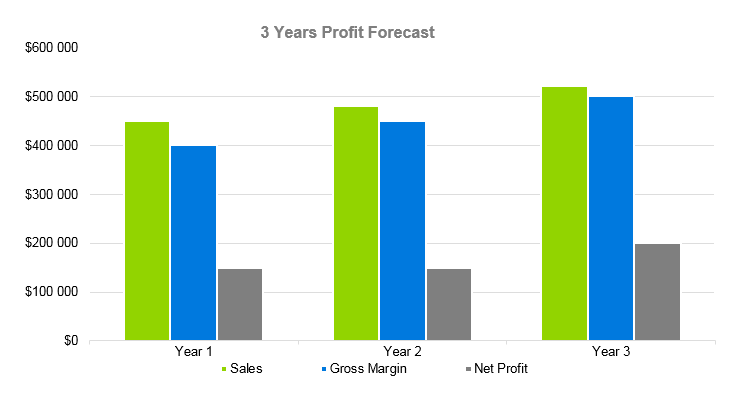
“The company is expecting a home care agency business plan loan for five years from its investors. Later on, we will manage the cash flow to finance the growth without requiring additional debt. We are planning to have full sales on credit. Hence, we need proper cash in hand in the beginning to avoid any problems related to the cash flow.“
Company Summary
When setting up a care company, you need to explain how you are going to make a presence in the market. For example, “Our agency will be based on a central location of Kansas and provide different services to clients and patients coming from Wilson, Neodesha, and Labette Counties, within the radius of 90 miles of our corporate offices.”
Here, you need to define your company and goals when you start a home health agency. You may want to promote and market your business and make an online presence by starting a website.
Company Owner
As a limited liability company, Wheatland Home Healthcare Agency is going to be operated and owned by Ethan J. Peter (name of company owner).
Along with years of experience in healthcare industry, explain the specialization and qualification of the owner.
Why the home health care business is being started?
When making a non-medical home care business plan, explain what the inspiration behind starting a home health care business is. Do you have a strong desire to help people in need which drives you to make it your profession? Do you have years of experience working with a healthcare organization and want to start your own home care agency business ?
How the home health care business will be started?
Since your company is being started, you will definitely need to address your funding matters and startup costs. In this sample business plan for home health care agency, we have listed the assets required for start-up, a breakdown of start-up expenses, total cash required, total funding, investment, capital, and other liabilities along with the startup cost diagram to illustrate the expected expenses, investment, assets, bank loans for the business plan , etc.
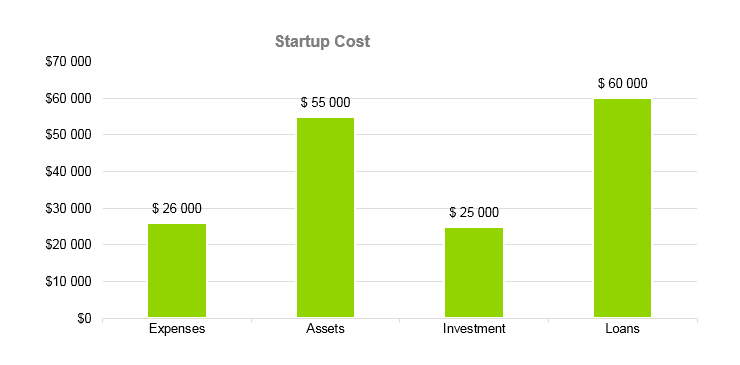
Services for Customers
The home health care agency’s business plan should be aimed to help people with special needs as well as elderly in their daily activities and providing all the living help at the home. The company should also retain a skilled team of healthcare professionals, in case any specific treatment is required or in an emergency.
Along with at-home facilities, your company should also provide facilities to take them out if they are not able to drive their car. In this section of a home care business plan , you need to describe the services you have planned to offer.
As a home care agency business plan , you should ensure that all your clients/patients have been treated well. The following services should be provided by specialized health care nurses, physicians, mental health counselors, physical therapists, chiropractors, rehab counselors, and other professionals who are well versed in providing valuable services. Your non-medical home care agency business plan should include the following services –
- Nursing Aide
- Skilled Nursing
- Social Work
- Personal Injury Case Management
- Physical, Occupational, and Speech Therapy
- Personal Assistance Services
- Home Medication Management
When creating a business plan for home health care agency, you may also want to provide resource linkage, assessment, planning, and reporting services for injury case management.
Marketing Analysis of Home Health Care Business
When raising funds, the best thing you can have is a foolproof business plan for home care agency to stand out in the competition and market your home care agency business . It goes without saying that home health care is a growing industry on both the national and international levels. If your community has become an over-saturated market with a lot of home health care services out there, you must have a lot of competition to face.
However, a strong marketing analysis on home care services business plan can save you and drive you to penetrate the market in the short term. You need to figure out the weak point of your competitors and make proper marketing strategies.
For better insight, consider the following home health care business plan example in this segment.
The Wheatland Home Health Care Agency’s customer base would generally consist of patients who are referred by health care facilities, physicians, and other professionals in the industry. Only a small percentage of patients will be covered by any private insurance company because most of them will be insured by Medicare.
For the Personal Injury Case Management part of our business plan for domiciliary care agency , the customer base generally includes the patients who have been injured in any kind of accident or in the job. These patients will usually get referred from lawyers looking for case management services for them or insurance providers seeking help to mitigate the loss of their clients and injuries.
Market Trends
The target customers of personal injury case management, as well as home health care agency business plans , usually don’t do comparison shopping directly. They usually prefer the health care providers who are referred by their physicians.
When it comes to assessing competition in the field of home health care, the most vital aspect here is consulting with other professionals and asking them to refer their clients to your agency. For doing this, your agency should provide the best patient care and showcase professional business management and organization, and pertinent and current qualifications. It will help you to capture most of the personal injury case management and home healthcare market in your respective area.
Marketing Segmentation
The target market for home health care business should be an aging population who prefer to stay in their homes most of the time and go out mostly for seeing doctors instead of being admitted to a nursing home. Your target market should cover especially the patients who are aging and need proper health care services from a well-trained nursing team. They may also call for other home care services like social work, to gather important resources from the community.
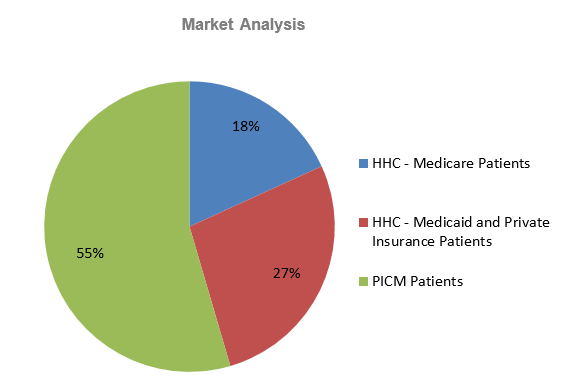
Next up, you may want to target the people who need personal injury case management solutions. You can help them in dealing with financial, medical, and work-related issues.
Since you are specialized in community-oriented services and home health care services, your target should be the segments where your services are needed the most. By working for those market segments, which need home care services only, you can save overhead expenses significantly, as you will not have to set up another office space.
Product Pricing
When acquiring home health care services, trust is the major aspect for both referring professionals and customers. They should have faith in your home care service for reliability, professionalism, and quality.
The customer’s choices do not get affected with the pricing of your services. A lot of those services are covered under Medicaid, Medicare, and private insurance providers and the rates are set by them.
Pricing is a very determining factor for personal injury case management. It varies from case to case and is paid on an hourly basis, which is subject to negotiation. When it comes to providing personal injury case management, the pricing would be estimated on the total time required for the client.
Absolutely great experience I am really …
Absolutely great experience I am really impressed thanks Alex
Home Health Care Marketing Strategy
So you have developed a full-fledged domiciliary care agency business plan and go through all the complex processes of Medicare and state certificate. You have also recruited experienced professionals.
The next thing to consider in a free business plan for home health care agency is the way to attract clients. This is where you need proper marketing strategies to ensure success.
Competitive Analysis
In this free home health care agency business plan , we will start with your competitive edge. If you have learned a lot of daily administrative duties and have experience in home care agency business plan , you can make it successful. Your reputation can help you build a solid client base even before starting your home care agency business plan .
Sales Strategy
Here, you need to provide the best patient service and ensure complete satisfaction from referring to healthcare facilities and physicians.
Sales Monthly
This part should contain your projected monthly sales in home care agency business .
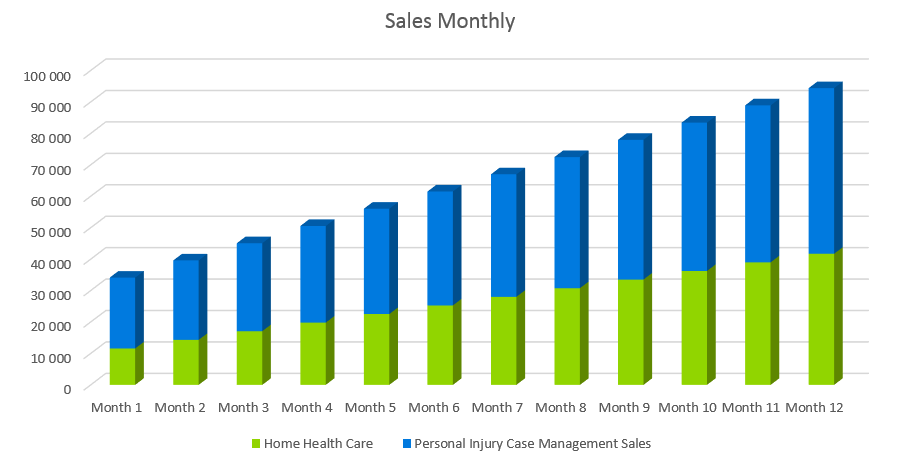
Sales Yearly
Define annual projected sales from your home care agency business for three years in this section.
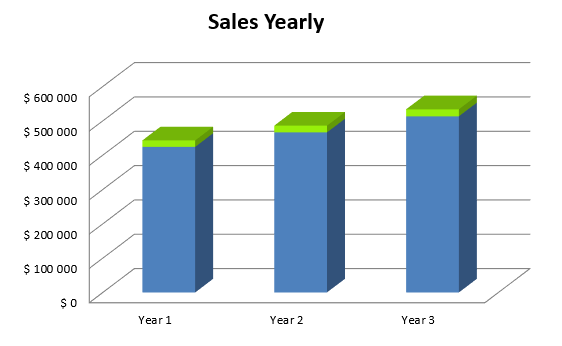
Sales Forecast
It reflects the conservative average of your patients during the first year along with modest year-by-year rise. It should be based on the total patients you are seeing currently in your home health care business.
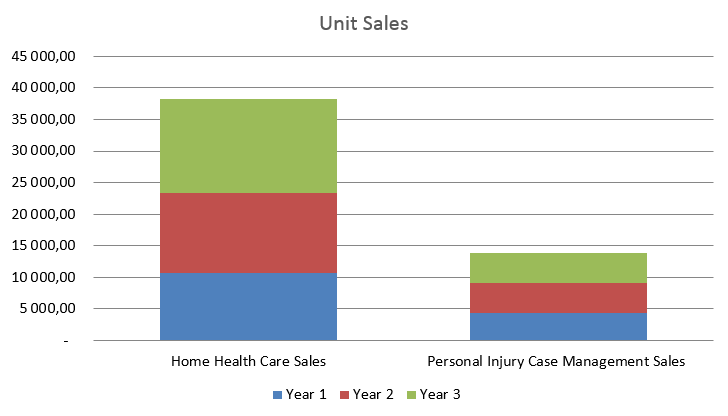
Personnel plan
In this sample business plan for home care agency, the following points should explain your staff requirements, benefits, and costs needed to hire them. You should also consider the cost of living of employees without affecting your administration. Project the growth of the client base without any impact on payroll because of increased working hours.
Company Staff
In this part of home health care agency business plan free, explain the number of employees as well as who will be hired for what services and for how many hours.
Average Salary of Employees
This part should contain the breakdown of an average salary of each employee in your organization for the next three years.
Financial Plan
As discussed, you may want to use your cash flow to finance your growth. It will ensure slow but steady growth. The collection of dues plays a very vital role in non-medical home care business profits. The services will be mainly reimbursed by insurance providers.
Important Assumptions
The assumptions table showcases major annual assumptions based on tax rates, interest rates as well as staff requirements. For example, we assume no major recession and strong economy, as well as no major and unexpected change in federal policy.
Brake-even Analysis
In a home health care agency business plan , the brake-even analysis is based on Average Variable cost (per unit) and fixed monthly costs.

Projected Profit and Loss
You need to project the overall profit and loss, with sales, rise over the next three years and profits should be notable in the beginning. Also, project your expenses and primary costs in providing services on a monthly and annual basis.
Profit Monthly
In this section, you need to show the detailed overview of your monthly profits for the 12 months in the next 3 years.
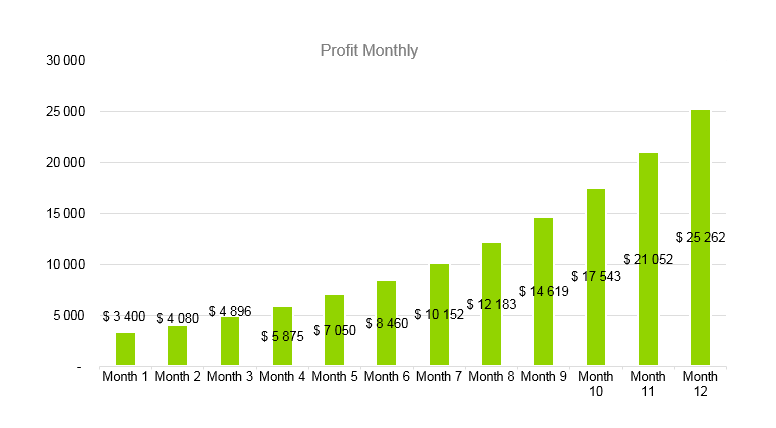
Profit Yearly
Your investors may also want to know the annual profits your business can make. It will also help you determine the estimate annual profits for the next 3 years

Gross Margin Monthly
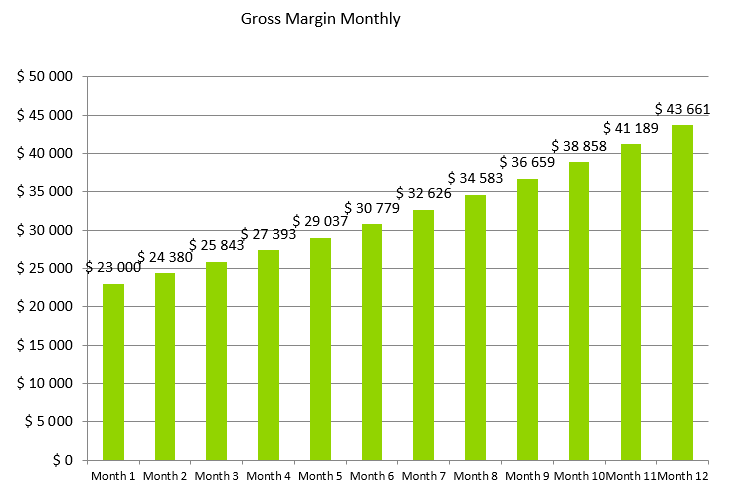
You need to show up your gross margin on monthly basis in your home health care agency business plan .
Gross Margin Yearly
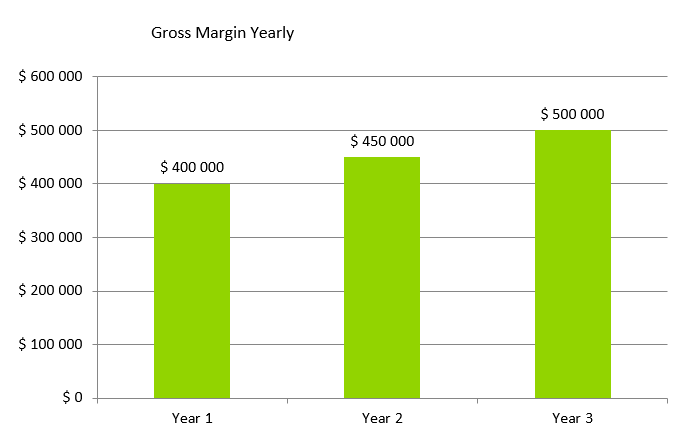
For this section, you can mentkon the annual gross margin you are expecting for the next 3 years.
Projected Cash Flow
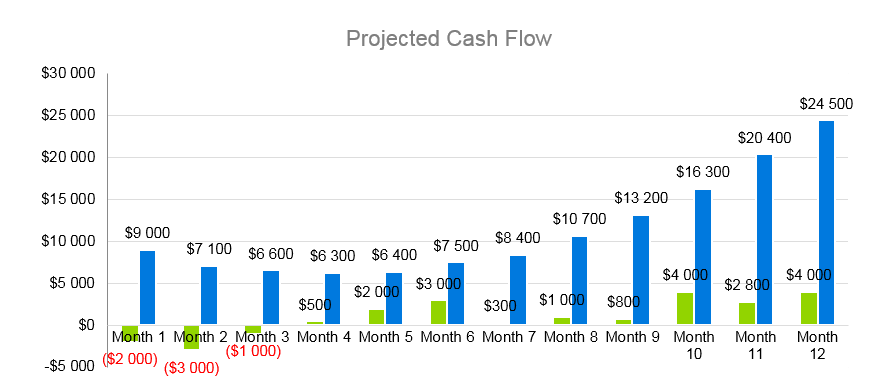
It should show annual amounts, which are important to your home care agency business plan success. The following table represents cash flow on monthly basis.
Projected Balance Sheet
The projected balance sheet of your home care business should show sufficient net worth growth and healthy financial state.
Business Ratios
The projected business ratios should be based in comparison with home health care standards. Expect to have healthy ratios for risk, profitability, and returns.
Download Home Health Care Business Plan Sample in pdf
OGS capital writers specialize in business plan themes such as cannabis producer business plan , business plan for a medical clinic , healthcare business plan , medical waste management business plan , medical marijuana dispensary business plan , business plan for Herbalife and many other business plans.
OGSCapital’s team has assisted thousands of entrepreneurs with top-rate business plan development, consultancy and analysis. They’ve helped thousands of SME owners secure more than $1.5 billion in funding, and they can do the same for you.

Ice Vending Machine Business Plan

OGScapital at the National Citizenship and Immigration Conference

How to Start a Plumbing Business in 2024: A Detailed Guide

Vegetable Farming Business Plan

Trading Business Plan

How To Write A Textile Manufacturing Business Plan

Any questions? Get in Touch!
We have been mentioned in the press:
Leave a Reply Cancel reply
Your email address will not be published. Required fields are marked *
Save my name, email, and website in this browser for the next time I comment.
Search the site:
- Aerospace & Aviation Overview
- Aircraft Hull Deductible Insurance
- Airline Insurance & Risk Management
- Airshow Insurance
- Drone Insurance
- Glider Insurance
- Gyrocopter Insurance
- Helicopter Insurance
- One Up, One Down Aviation Insurance Policy
- Space & Satellite Insurance
- Vintage Aircraft Insurance
- Art, Jewellery & Specie Insurance Overview
- Art, Museums & Exhibitions Insurance
- Fine Art Insurance
- Jewellers Block & Specie Insurance
- Automotive Overview
- Classic Car Restoration Insurance
- Driving Instructor Insurance
- Limousine Insurance
- Self-Drive Car Hire Insurance
- Care Overview
- Care Home Insurance
- Care Insurance
- Children's Home Insurance
- Domiciliary Care Insurance
- Fostering & Adoption Agencies
- Supported Living Insurance
- Charities & Not For Profit Overview
- Buddhist Temple Insurance
- Charity Insurance
- Charity Shop Insurance
- Community Transport Insurance
- Minibus Insurance
- Social Housing Insurance
- Youth Club Insurance
- Construction Overview
- Construction Insurance
- Contractors Insurance
- CPA Members Insurance
- Roofing & Scaffolding Insurance
- Surety Bonds
- Tradesman Insurance
- Education Overview
- Education Insurance
- Schoolshare
- Energy Overview
- Renewable Energy Insurance
- Energy Insurance
- Farming Insurance
- Hospitality, Leisure & Tourism Overview
- Hospitality & Leisure Insurance
- Holiday & Home Parks Overview
- Holiday Home Owner Insurance
- Holiday Let Insurance
- Holiday & Home Parks Insurance
- Theme Park & Leisure Attractions
- Legal and Indemnity Overview
- Dispute Resolution
- Legal Indemnity
- Professional Indemnity
- Warranty & Indemnity
- Life Sciences Overview
- Clinical Trials Insurance
- Life Sciences Insurance
- Life Sciences Start-Up Insurance
- Manufacturing Overview
- Manufacturing & Heavy Engineering
- Food & Drink
- Marine Overview
- Commercial Craft Insurance
- Marine Trade Insurance
- Superyacht Insurance
- Yacht & Motorboat Insurance
- Media & Entertainment Overview
- Firework & Pyrotechnics Insurance
- Media, Entertainment & Events Insurance
- Motor Trades Overview
- Auto Electrician Insurance
- Body Shop Insurance
- Breakdown & Recovery Agents
- Car Dealership Insurance
- Car Valeting Insurance
- Combined Motor Trade Insurance
- Mobile Mechanic Insurance
- MOT & Service Stations Insurance
- Motor Trade Insurance
- Motorcycle Trader Insurance
- No-Claims Motor Trade Insurance
- Part-Time Motor Trade Insurance
- Road Risk Insurance for Motor Traders
- Service and Repair Garage Insurance
- Smart Repair Insurance
- Startup Motor Traders Insurance
- Tyre Fitter Insurance
- Vehicle Sales Insurance
- Young Motor Traders Insurance
- Public Sector
- Real Estate Overview
- Block of Flats Insurance
- Estates Insurance
- Freeholders Insurance
- Landlord Insurance
- Legal Indemnity Insurance
- Propertymark Members
- Real Estate Insurance
- Unoccupied Property Insurance
- Transportation Overview
- Courier Fleet Insurance
- Courier Van Insurance
- Goods in Transit Insurance
- Hanson Franchisee Insurance
- Haulage & Distribution Insurance
- Passenger Transport Insurance
- Railway Insurance
- Taxi Fleet Insurance
- Taxi Insurance
- Transportation Insurance
- Vehicle Transporters Insurance
- Technology & Telecommunications Overview
- Hardware & Electronics Insurance
- Media Insurance
- Software & IT Services Insurance
- Technology Insurance
- Telecommunications Insurance
- Travel Overview
- Airline Personnel Travel Insurance
- Group Business Travel Insurance
- Scheduled Airline Failure Insurance
- Travel Agents Insurance
- Travel Insurance
- Corporate Insurance Overview
- Casualty Insurance
- Claims Management
- Commercial Property Insurance
- Crisis Management Overview
- Crisis Resilience Insurance
- Kidnap & Ransom Insurance
- Terrorism Insurance
- Cyber Liability
- Delegated Authority
- Directors & Officers Liability
- Dispute Resolution Insurance
- Fleet & Commercial Vehicle Insurance
- General Liability Insurance
- Intellectual Property Insurance
- Latent Defects Insurance
- Mergers & Acquisitions
- Professional Indemnity Insurance
- Retail Insurance
- Structured Credit & Political Risk Overview
- Commodity Traders
- Credit & Political Risk Cover
- Non-Payment Insurance for Banks
- Private Equity
- Public Agency & Multilateral Organisations
- Trade Credit
- Warranty & Indemnity Insurance
- Personal & Household Overview
- Aviation Insurance Overview
- Landlord Overview
- HMO Landlord Insurance
- Multi-Property Landlord Insurance
- Student Landlord Insurance
- Golfers Insurance
- Home & Contents Overview
- Home Insurance
- High Net Worth Home Insurance
- Holiday Home Insurance
- Non-Standard Home Insurance
- Thatched Property Insurance
- Motor Overview
- Car Insurance
- Prestige & Classic Car Insurance
- Van Insurance
- Risk Management Overview
- Business Continuity Planning
- Cyber Risk Management
- Enterprise Risk Management
- Fleet Risk Management
- Health & Safety Risk Management
- Property Loss Control
- Small Business Insurance Overview
- Builders Insurance
- Professional Indemnity Overview
- Accountants Professional Indemnity Insurance
- Gardeners Insurance
- IT Consultant Insurance
- Public Liability Insurance
- Shop & General Retail Overview
- Restaurant Insurance
- Shop Insurance
- Specialist Solutions Overview
- Affinity Partnership Schemes
- Alternative Therapists Insurance
- Dance Teacher's Insurance
- Fitness Instructor Insurance
- Hairdresser & Barber Insurance
- Members and Visitors Insurance
- Office Insurance
- Personal Trainer Insurance
- Recruitment Agency Insurance
- Removals & Storage Insurance
- Rope Access Insurance
- Tanning Salon Insurance
- Travel Agents & Tour Operators
- Tradesman Overview
- Carpenter Insurance
- Electrician Insurance
- Handyman Insurance
- Plumber Insurance
- Self-employed Insurance
- Tree Surgeon Insurance
- Window Cleaner Insurance
- Culture Change Consulting
- Communication Consulting
- Financial Wellbeing Solutions
- Organisational Wellbeing Overview
- Organisational Wellbeing Consulting
- Diversity, Equity and Inclusion Consulting
- Employee Benefits Consulting Overview
- Asset Management
- Benefits Strategy
- Flexible Benefits & Technology
- Healthcare & Protection
- Multinational Benefits
- Workplace Pensions
- Reward Consulting Overview
- Bonus Plan Design
- Executive Remuneration
- Gender Pay Reporting
- HR and Reward Training
- International Reward Management
- Job Evaluation
- Long Term Incentive Plans
- Pay Benchmarking
- Reward & Recognition
- Salary Surveys
- Share Schemes & Sales Incentive Plans
- News & Insights
- Gallagher Better Works
- Media Centre
- The Gallagher Way
- UK Executive Team
- International Operations
- Premiership Rugby Partnership
- FATCA Forms
- Modern Slavery
- Bland Bankart Retirement Benefits Scheme
- COVID-19 Risk Assessment
- Gender Pay Gap Reports
- Office Locations
How to start a domiciliary care agency
20 july 2023.

When considering how to start a private home care business in the UK, there will be many factors to think about as you shape your company and its offering.
We have created the guide below to outline how to set up a domiciliary care agency and all this entails—from the research stages to the moment you welcome your first clients.
In this guide, we cover:
What is a domiciliary care agency?
Research and market analysis, choosing the services you will offer, how to find your clients, appointing a registered manager, start-up costs to consider, creating a business plan, how to decide on your pricing, creating a marketing strategy, outlining your policies and procedures, exploring financing options, applying for a countersigned dbs check, your cqc registration inspection, registering your business with hmrc, start trading and building your business.
Domiciliary care is an alternative to traditional residential care. The services provided by a home care business can include a range of medical and personal care to help people with their daily living, within the comfort of their own home. The type of care a domiciliary care business provides will depend on the type of staff it employs, such as carers, nurses and therapists—as well as their qualifications.
When considering how to set up a domiciliary care company, it’s important to plan out the finer details of your business from the word go. The following steps can provide a useful structure.
Before fleshing out your business plan, explore your market.
- Look at what your competitors are doing, where they are located, their pricing plans, etc.
- Research the area you plan to serve and whether there is enough population density to support your business, taking into account socio-economic information and age demographics.
- Familiarise yourself with the appropriate care legislation and regulations, including the Domiciliary Care Agencies Regulations 2002 and the requirements of the Care Quality Commission (CQC) .
Your research will help you decide on the types of services your business will provide. These may be medical or non-medical home care or a mixture of both:
- Nursing and healthcare—changing dressings, administering medications
- Personal care—washing and dressing, using the toilet, getting in and out of bed
- Home help—day-to-day domestic tasks such as cleaning, preparing meals, washing up, laundry, gardening
- Companionship
- Additional tasks such as grocery shopping and collecting prescriptions.
Decide how you want to secure business for your home care agency. Will you provide your services to self-funding clients? Or, will you enter local authority tenders to build your business? You might wish to do both. Again, your research can help you determine your choice.
Every home care agency must have a registered manager. This person manages the day-to-day running of the agency and oversees its activity, ensuring it complies with regulations. The registered manager could be the business owner if they intend to be in charge full-time, or a senior staff member recruited from the outset to manage the agency.
In England, the required qualifications for a registered manager are:
- QCF Level 5 Diploma in Leadership for Health and Social Care (Management of Adult Services) or
- Registered Manager’s Award (RMA) or
- NVQ Level 4 in Leadership and Management for Care Services.
Calculating your upfront costs and your outgoings for your first year of trading can be vital to ensuring you get the business off to a good start. Consider the following:
- Equipment costs
- Recruitment costs
- Marketing investment
- Training requirements
- Business rates
- Annual CQC fees (there is no initial registration fee)
- Specialist domiciliary care insurance , including public and employers’ liability, and professional indemnity.
Your business plan should cover every part of your journey, from competitor analysis to cash forecasts and operational costs. You can then use your business plan to apply for business funding. Your plan doesn’t have to be set in stone, but it does need to present realistic predictions of what you are hoping to achieve.
Your pricing will depend on a number of factors, including:
- Whether the care is medical or non-medical, and the level of care required
- Equipment you will need
- How many carers are required per client at one time
- Day-to-day operating costs
- Whether a client is 100% self-funded or receiving a grant from their local authority, NHS or a charity
- Your location, your closest competitors and their pricing
- Your expected profit margins.
Your marketing strategy will depend on who you are selling to but also how you want to position your brand. What is your unique selling proposition (USP)? This is what makes you stand out from the competition. It may be a certain service you offer, the level of expertise your team provides, the geographical area(s) you serve, or your pricing structure.
Once you are clear on your USP and messaging, consider how you will market your business.
- If you haven’t already, decide on a name for your agency—something simple, unique and memorable that reflects your values.
- Create your own website—use a simple website builder or enlist the services of a local marketing agency.
- Use social media—set up social media accounts and keep a consistent flow of content to build your online presence.
- Printed literature—post leaflets and flyers through doors, display them in newsagents’ windows, etc.
- Word of mouth—spread the word to friends and family, local community groups and other businesses.
Your policies and procedures will act as internal guidelines to govern how you and your staff will provide your services. Various templates and toolkits are available online to help you create domiciliary care policies and procedures documentation that are written to reflect the CQC regulatory, legislative and good practice guidance.
Before making any financial commitments or purchases, you must set up a business bank account for your home care agency. Decide where your initial financing will come from, whether you will use your own money or take out a start-up loan or business loan.
Disclosure and Barring Service (DBS) checks are a legal requirement for domiciliary care agencies, and as an employer, you must keep on top of your DBS checks. If you are applying to be a registered partner, registered manager or individual provider, you must have an enhanced DBS check that is no more than 12 months old when you apply for CQC registration.
If you are not already a registered healthcare professional, you will need to apply for a CQC countersigned enhanced DBS check (CQC-CE-DBS), which authorises the CQC to carry out extra checks to confirm your identity as part of the DBS process.
All domiciliary care providers must register with the industry regulator, the Care Quality Commission, before they start trading. To grant registration, the CQC must be satisfied that the business is fit to trade as per the requirements set out in the Health and Social Care Act 2008 and compliant with the requirements of the relevant regulations and enactments. Our guide to the CQC explains more, including the five key questions they use to structure their inspection.
You can register with the CQC as a new provider here . While you won’t need to pay an application fee, once registered you must pay an annual fee towards ongoing monitoring.
Setting up your domiciliary care business as a sole trader means you must register for self-assessment with HMRC for your annual tax returns. If you’re registering as a partnership , each partner must register separately.
You may choose to set up a limited company rather than take the sole trader or partnership approach, in which case you must register your company with Companies House and can be registered for Corporation Tax simultaneously.
Once your domiciliary care business is up and running, you can determine what is working well in terms of staffing, service provision, marketing and general operations, and where your business plan might need tweaking. As your business begins to grow, remember to make the most of the resources available to you, from government advice and support to industry-specific events such as roadshows and conferences for care managers.
The CQC will undertake regular inspections of your agency to ensure ongoing quality and compliance, and provide you with a rating, which you can use to help market your business and instil confidence in your clients.
If you are in the process of planning or starting our own domiciliary care business, we wish you the very best. If you would like specialist advice on your domiciliary care insurance and risk management requirements, please do not hesitate to get in touch with our team.
Gallagher Care Team
- 0800 062 2325
The sole purpose of this guide is to provide guidance on the issues covered. This article is not intended to give legal advice, and, accordingly, it should not be relied upon. It should not be regarded as a comprehensive statement of the law and/or market practice in this area. We make no claims as to the completeness or accuracy of the information contained herein or in the links which were live at the date of publication. You should not act upon (or should refrain from acting upon) information in this publication without first seeking specific legal and/or specialist advice. Arthur J. Gallagher Insurance Brokers Limited accepts no liability for any inaccuracy, omission or mistake in this publication, nor will we be responsible for any loss which may be suffered as a result of any person relying on the information contained herein.
Related News & Insights
Stay connected with the company that’s connecting the dots with what’s happening in the industry and around the world.

Care Sector Health & Safety: A Closer Look at the Top 6 Priorities
Lifetime caps on aged care costs: the shifting paradigm in social care, beyond today: what are the top five geopolitical risks and opportunities for uk businesses.

Start your journey with Gallagher. Connect with an expert.

Home Health Care Business Plan Template
Written by Dave Lavinsky

Over the past 20+ years, we have helped over 10,000 entrepreneurs and business owners create business plans to start and grow their home health care businesses. On this page, we will first give you some background information with regards to the importance of business planning. We will then go through a home health care business plan template step-by-step so you can create your plan today.
Download our Ultimate Business Plan Template here >
What is a Home Health Care Business Plan?
A business plan provides a snapshot of your home health care business as it stands today, and lays out your growth plan for the next five years. It explains your business goals and your strategy for reaching them. It also includes market research to support your plans.
Why You Need a Business Plan for a Home Health Care Agency
If you’re looking to start a home health care business, or grow your existing home health care business, you need a business plan. A business plan will help you raise funding, if needed, and plan out the growth of your home health care business in order to improve your chances of success. Your home health care business plan is a living document that should be updated annually as your company grows and changes.
Sources of Funding for Home Health Care Businesses
With regards to funding, the main sources of funding for a home health care business are personal savings, credit cards, bank loans and angel investors. With regards to bank loans, banks will want to review your business plan and gain confidence that you will be able to repay your loan and interest. To acquire this confidence, the loan officer will not only want to confirm that your financials are reasonable, but they will also want to see a professional plan. Such a plan will give them the confidence that you can successfully and professionally operate a business.
The second most common form of funding for a home health care business is angel investors. Angel investors are wealthy individuals who will write you a check. They will either take equity in return for their funding, or, like a bank, they will give you a loan. Venture capitalists will not fund a home health care business. They might consider funding a home health care business with a national presence, but never an individual location. This is because most venture capitalists are looking for millions of dollars in return when they make an investment, and an individual location could never achieve such results.
Finish Your Business Plan Today!
Home health care business plan template.
If you want to start a home health care business or expand your current one, you need a business plan. Below are links to each section of your home health care business plan template:
Executive Summary
Your executive summary provides an introduction to your business plan, but it is normally the last section you write because it provides a summary of each key section of your plan.
The goal of your Executive Summary is to quickly engage the reader. Explain to them the type of home health care business you are operating and the status. For example, are you a startup, do you have a home health care business that you would like to grow, or are you operating a chain of home health care businesses.
Next, provide an overview of each of the subsequent sections of your plan. For example, give a brief overview of the home health care industry. Discuss the type of home health care business you are operating. Detail your direct competitors. Give an overview of your target customers. Provide a snapshot of your marketing plan. Identify the key members of your team. And offer an overview of your financial plan.
Company Analysis
In your company analysis, you will detail the type of home health care business you are operating.
For example, you might operate one of the following types of home health care businesses:
- Nursing care business : this type of home health care business is the most common, where the patient is given a doctor-approved plan of care specific to the patient’s clinical needs and delivered within the comfort of their home.
- Physical home health care business : this type of home health care business provides physical therapy to patients who need help regaining their muscle and joint strength.
- Home health care aides : this type of home health care business provides patients with home health care aides who assist them with basic daily tasks, such as bathing, cooking, and dressing.
In addition to explaining the type of home health care business you will operate, the Company Analysis section of your business plan needs to provide background on the business.
Include answers to question such as:
- When and why did you start the business?
- What milestones have you achieved to date? Milestones could include the number of home health care patients, growth year over year, etc.
- Your legal structure. Are you incorporated as an S-Corp? An LLC? A sole proprietorship? Explain your legal structure here.
Industry Analysis
In your industry analysis, you need to provide an overview of the home health care business.
While this may seem unnecessary, it serves multiple purposes.
First, researching the home health care industry educates you. It helps you understand the market in which you are operating.
Secondly, market research can improve your strategy, particularly if your research identifies market trends.
The third reason for market research is to prove to readers that you are an expert in your industry. By conducting the research and presenting it in your plan, you achieve just that.
The following questions should be answered in the industry analysis section of your home health care business plan:
- How big is the home health care industry (in dollars)?
- Is the market declining or increasing?
- Who are the key competitors in the market?
- Who are the key suppliers in the market?
- What trends are affecting the industry?
- What is the industry’s growth forecast over the next 5 – 10 years?
- What is the relevant market size? That is, how big is the potential market for your home health care business? You can extrapolate such a figure by assessing the size of the market in the entire country and then applying that figure to your local population.
Customer Analysis
The customer analysis section of your home care agency business plan must detail the customers you serve and/or expect to serve.
The following are examples of customer segments: parents of elderly individuals, retired seniors, senior community program managers, etc.
As you can imagine, the customer segment(s) you choose will have a great impact on the type of home health care business you operate. Clearly, parents of elderly individuals would want different service options and would respond to different marketing promotions than senior community program managers, for example.
Try to break out your target customers in terms of their demographic and psychographic profiles. With regards to demographics, include a discussion of the ages, genders, locations and income levels of the customers you seek to serve. Because most home health care businesses primarily serve customers living in their same city or town, such demographic information is easy to find on government websites.
Psychographic profiles explain the wants and needs of your target customers. The more you can understand and define these needs, the better you will do in attracting and retaining your customers.
Finish Your Home Health Care Business Plan in 1 Day!
Don’t you wish there was a faster, easier way to finish your business plan?
With Growthink’s Ultimate Business Plan Template you can finish your plan in just 8 hours or less!
Competitive Analysis
Your competitive analysis should identify the indirect and direct competitors your business faces and then focus on the latter.
Direct competitors are other home health care businesses.
Indirect competitors are other care options that people have that aren’t direct competitors. This includes hospitals, nursing homes, and people who help relatives with home health care needs. You need to mention such competition to show you understand that not everyone who needs healthcare assistance will utilize a home health care company.
With regards to direct competition, you want to describe the other home health care businesses with which you compete. Most likely, your direct competitors will be home health care businesses located very close to your location.
For each such competitor, provide an overview of their businesses and document their strengths and weaknesses. Unless you once worked at your competitors’ businesses, it will be impossible to know everything about them. But you should be able to find out key things about them such as:
- What types of patients do they help?
- What types of services do they offer?
- What is their pricing (premium, low, etc.)?
- What are they good at?
- What are their weaknesses?
With regards to the last two questions, think about your answers from the customers’ perspective. And don’t be afraid to ask your competitors’ customers what they like most and least about them.
The final part of your competitive analysis section is to document your areas of competitive advantage. For example:
- Will you provide superior services?
- Will you provide services that your competitors don’t offer?
- Will you make it easier or faster for customers to use your services?
- Will you provide better customer service?
- Will you offer better pricing?
Think about ways you will outperform your competition and document them in this section of your plan.
Marketing Plan
Traditionally, a marketing plan includes the four P’s: Product, Price, Place, and Promotion. For a home health care business plan, your marketing plan should include the following:
Product : In the product section, you should reiterate the type of home health care business that you documented in your Company Analysis. Then, detail the specific products you will be offering. For example, in addition to home health care, will you provide superior customer service, 24/7 call centers, or emergency services?
Price : Document the prices you will offer and how they compare to your competitors. Essentially in the product and price sub-sections of your marketing plan, you are presenting the services you offer and their prices.
Place : Place refers to the location of your home health care business office. Document your location and mention how the location will impact your success. For example, is your home health care business office operated remotely, located near a main highway, near public transportation, etc. Discuss how your location might provide a steady stream of customers.
Promotions : The final part of your home health care marketing plan is the promotions section. Here you will document how you will drive customers to your location(s). The following are some promotional methods you might consider:
- Advertising in local papers and magazines
- Reaching out to local websites
- Social media marketing
- Local radio advertising
Operations Plan
While the earlier sections of your home health agency business plan explained your goals, your operations plan describes how you will meet them. Your operations plan should have two distinct sections as follows.
Everyday short-term processes include all of the tasks involved in running your home health care business, including hiring quality home care professionals, training employees, and administrative tasks.
Long-term goals are the milestones you hope to achieve. These could include the dates when you expect to serve your 100th patient, or when you hope to reach $X in revenue. It could also be when you expect to expand your facility or launch in a new location.
Management Team
To demonstrate your home health care business’ ability to succeed, a strong management team is essential. Highlight your key players’ backgrounds, emphasizing those skills and experiences that prove their ability to grow a company.
Ideally you and/or your team members have direct experience in managing home health care businesses. If so, highlight this experience and expertise. But also highlight any experience that you think will help your business succeed.
If your team is lacking, consider assembling an advisory board. An advisory board would include 2 to 8 individuals who would act like mentors to your business. They would help answer questions and provide strategic guidance. If needed, look for advisory board members with experience in managing home health care companies or successfully running small businesses.
Financial Plan
Your financial plan should include your 5-year financial statement broken out both monthly or quarterly for the first year and then annually. Your financial statements include your income statement, balance sheet and cash flow statements.
Income Statement : an income statement is more commonly called a Profit and Loss statement or P&L. It shows your revenues and then subtracts your costs to show whether you turned a profit or not.
In developing your income statement, you need to devise assumptions. For example, will you assist 50 patients per month or 100? And will sales grow by 2% or 10% per year? As you can imagine, your choice of assumptions will greatly impact the financial forecasts for your business. As much as possible, conduct research to try to root your assumptions in reality.
Balance Sheets : Balance sheets show your assets and liabilities. While balance sheets can include much information, try to simplify them to the key items you need to know about. For instance, if you spend $100,000 on building out your home health care business, this will not give you immediate profits. Rather it is an asset that will hopefully help you generate profits for years to come. Likewise, if a bank writes you a check for $100,000, you don’t need to pay it back immediately. Rather, that is a liability you will pay back over time.
Cash Flow Statement : Your cash flow statement will help determine how much money you need to start or grow your business, and make sure you never run out of money. What most entrepreneurs and business owners don’t realize is that you can turn a profit but run out of money and go bankrupt. For example, let’s say a local senior living community approached you with a $50,000 partnership contract to provide home health care services for their occupants. Let’s further assume the contract would cost you $50,000 to fulfill in terms of increased staffing costs. Well, in most cases, you would have to pay that $50,000 now for employee salaries, utilities, etc. But let’s say the company didn’t pay you for 180 days. During that 180-day period, you could run out of money.
In developing your Income Statement and Balance Sheets be sure to include several of the key costs needed in starting or growing a home health care business:
- Cost of equipment like standard nursing supplies, sanitary products, and emergency medications
- Payroll or salaries paid to staff
- Business insurance
- Taxes and permits
- Legal expenses
Attach your full financial projections in the appendix of your plan along with any supporting documents that make your plan more compelling. For example, you might include your Medicaid and Medicare certifications.
Putting together a business plan for your home health care business is a worthwhile endeavor. If you follow the example template above, by the time you are done, you will have an expert home health care business plan; download it to PDF to show banks and investors. You will really understand the home health care industry, your competition, and your customers. You will have developed a marketing plan and will really understand what it takes to launch and grow a successful home health care business.
Home Health Business Plan FAQs
What is the easiest way to complete my home health care business plan.
Growthink's Ultimate Business Plan Template allows you to quickly and easily complete your Home Health Care Business Plan.
What is the Goal of a Business Plan's Executive Summary?
The goal of your Executive Summary is to quickly engage the reader. Explain to them the type of home health care business you are operating and the status; for example, are you a startup, do you have a home health care business that you would like to grow, or are you operating a chain of home health care businesses?
Don’t you wish there was a faster, easier way to finish your Home Health Care business plan?
OR, Let Us Develop Your Plan For You
Since 1999, Growthink has developed business plans for thousands of companies who have gone on to achieve tremendous success.
Click here to see how Growthink’s professional business plan consulting services can create your business plan for you.
Other Helpful Business Plan Articles & Templates


Domiciliary hospitalisation benefit: Get cover for treatment at home
I ndividuals should look for a health insurance cover which offers domiciliary hospitalisation benefit or take it as a rider to ensure comprehensive coverage. It provides coverage for medical treatment at home, ensuring comfort for the insured unable to be hospitalised.
This type of coverage is useful in situations where the insured is not able to get hospitalised due to non-availability of hospital beds or specific medical equipment. Domiciliary hospitalisation covers the treatment costs incurred at home when continuous hospitalisation is not possible. It offers convenience for patients needing medical attention without intensive care.
Reduces financial burden
Such a coverage reduces the financial burden by covering expenses like doctor’s visits and nursing care at home. Including domiciliary hospitalisation in a health insurance policy ensures comprehensive coverage for both hospital and home-based treatment, enhancing overall healthcare experience and financial security. This benefit ensures that the policyholder’s treatment expenses are covered under their health insurance policy. However, home care treatment is not covered by default in every health insurance policy. So, if the insured’s existing policy does not cover domiciliary hospitalisation, then he can port it to a new policy that has this feature.
Rakesh Goyal, director, Probus Insurance Broker, says domiciliary hospitalisation coverage can typically be added to an existing floater health insurance policy as a rider or as an optional add-on benefit. “This allows individuals to customise their health insurance coverage according to their specific needs and preferences.”
Domiciliary hospitalisation coverage is a part of the base plan these days in all the new and upcoming health policies. Siddharth Singhal, business head, Health Insurance, Policybazaar.com, says it can be included in some of the existing floater health insurance policies, thus eliminating the need for a separate policy. “It is advisable to select a comprehensive health insurance plan that covers all your medical insurance needs without you having to worry about financing sudden medical expenses.”
Pricing of the policy
Since the domiciliary hospitalisation benefit is part of the comprehensive plan, the customer does not need to pay anything extra. It covers doctor consultation fees, nursing charges, the cost of medical equipment and medication costs. Key exclusions may include pre-existing conditions, non-allopathic treatments, self-inflicted injuries, and certain elective procedures.
To avail domiciliary treatments, the insured will have to be on a home based treatment for atleast three days. Individuals must check the waiting period associated with domiciliary treatment before buying such a cover. The insured cannot file any claims for domiciliary hospitalisation during the waiting period, which varies between insurance companies.
“The policyholder must have the recommendation for domiciliary treatment by the treating doctor either in case the patient is immobile or the hospital lacks the bed/infrastructure, thus making home hospitalisation as the only option,” says Singhal.


IMAGES
VIDEO
COMMENTS
Key Elements of a Domiciliary Care Business Plan. 1. Market Analysis and Competitor Research. Before launching your domiciliary care business, a thorough analysis of the market is essential. Identify the demand for home care services in your target area, including the size of the aging population and their specific needs.
A strong financial plan is essential for demonstrating the viability of your domiciliary care business and securing funding from investors or lenders. This includes: A detailed start-up budget, outlining the costs of setting up your business, such as registration fees, insurance, equipment, marketing, and initial staff recruitment and training.
Domiciliary care services encompass a wide range of support, tailored to meet the specific needs of each individual. These services can include assistance with daily activities such as personal care, meal preparation, medication management, and companionship. In some cases, more complex care needs, such as nursing care or specialized therapies ...
Related. The domiciliary care industry is valued at £7.7bn in the UK, which signifies that it is a stable and secure business to invest in, but not in the absence of a plan. A business plan sets the groundwork for the growth of your business, so for your UK domiciliary care business to run successfully, you will need a plan.
A home care business summary should include: Your mission and the populations your business will serve. A list of your primary services. The demand for these services in your community. What sets your home care business apart from competitors. Your vision. A summary of funding needs. 2. The company description.
But you don't want them to get bored with an overly lengthy statement. You can always go into greater detail about your services in the products and services section of your business plan. 2. Be specific about your service offering. As a home health care business, you will likely provide a variety of services.
This step-by-step guide to creating a domiciliary care agency business plan will help you to design your dream business. It will include the following: Step 1: Remind Yourself Why You're Writing A Business Plan. Step 2: All About You. Step 3: Overview Summary of Your Business. Step 4: Your Services in More Detail. Step 5: Deep Dive on The Market
Corporate structure and experience. This is a critical part of your residential care home business plan, as specialist lenders look for prior care experience in making their decisions. If you're an ex-care manager looking to buy your first home, you should demonstrate your experience and history in the sector.
Home Care Business Plan Template. You will have a clear, concise idea of what the business is about and how the founder and current president, [owner name], intends to start, grow and continue strong and steady growth. The purpose of a business plan is to create a plan, a blueprint or roadmap on paper to follow.
Domiciliary care business plan. Your domiciliary care business plan is the foundation of how to grow your domiciliary care business. Your business plan will help you to map out your financial projections, refine your services, and set out your goals. Above all, your plan should be realistic. If an idea fails on paper, you should start afresh.
Embarking on the journey of starting a domiciliary care agency requires a well-thought-out plan. At Care Business Bootcamp, we provide expert guidance on developing a robust business plan tailored to your unique vision and goals. From outlining your services to financial projections, our training equips you with the essential tools to kickstart ...
Domiciliary care organisations have to obtain criminal records checks for their staff if they are based in the UK. For more information, contact: ... 2. Corporate statement of purpose, business plan 3. Employment contracts, job descriptions 4. Range of activities, business marketing literature 5. Service user needs assessment and plans or ...
Highlight Sales and Marketing Strategy. Like any business, cover all the marketing and sales details when you plan to start a new home care agency. When operating in a service-based home patient care industry, you need to adopt progressive measures to make your sales and marketing strategy work.
Your domiciliary care agency business plan needs to include: The home care services your agency will offer. That could include companionship, nursing, personal care, emergency support, housekeeping, and help with meals. When you have pinpointed your services, that will lead your recruitment strategy. The next step is to think about the ...
When starting any new business, there are many things to consider and many pitfalls to avoid. Launching a domiciliary care agency can arguably be an even more daunting task, with the added burden of registering with the Care Quality Commission. At Care Agency Media, we provide our clients with the tools and the resources they need to start and ...
Big expenses when launching your care business include: Incorporation fees - Around £100-£200 to formally create a company. Office space - Budget £200-£500 monthly for a basic office if needed. Equipment - A computer, phone, uniforms, medical supplies, etc. £1,000-£2,000. Website - £500-£1,500 for a professional site with SEO ...
Home healthcare is an $84 billion industry in the US alone and it is not going to slow down anytime soon. It covers both non-medical healthcare and skilled home health care, teams. Currently, the US has over 386,000 home health care businesses and employed more than 1.7 million people approx. But this home care agency business plan is not for ...
The services provided by a home care business can include a range of medical and personal care to help people with their daily living, within the comfort of their own home. The type of care a domiciliary care business provides will depend on the type of staff it employs, such as carers, nurses and therapists—as well as their qualifications.
In developing your Income Statement and Balance Sheets be sure to include several of the key costs needed in starting or growing a home health care business: Cost of equipment like standard nursing supplies, sanitary products, and emergency medications. Payroll or salaries paid to staff. Business insurance.
A well-structured business plan is crucial for the success of your domiciliary care business. It serves as a roadmap that outlines your objectives, target market, services offered, marketing ...
This business plan contains confidential, trade-secret information and is shared only with the ... Homecare is a new limited company (to be set-up, name reserved) which will provide domiciliary care services initially in Aberdeen, then to Dundee and Perth within 3 years. Directors are committing £24,000 raised from sale of existing business ...
This plan seeks to achieve objectives over a 3-5 year period with the unique service we are creating being replicated in other areas of Kirklees and beyond. 2.1 Scope and purpose of business plan This business plan has been prepared following a series of discussions and meetings of the Board members and planning sub-groups for CCCV. 2.
business continuity plan is likely to be a requirement of your existing contract with the local authority. CPA's business continuity plan template includes a list to help you work through your plan, and an actions log to record what you've agreed to do. Appendix 1 of this guide includes a quick checklist.
HealthChoices is the name of Pennsylvania's managed care programs for Medicaid / Medical Assistance recipients. Through managed care organizations, eligible individuals receive quality physical and behavioral medical care, as well as long-term supports. To learn more about available services, find information for participants and providers in ...
Domiciliary hospitalisation coverage is a part of the base plan these days in all the new and upcoming health policies. Siddharth Singhal, business head, Health Insurance, Policybazaar.com, says ...